Search Result for ""
Sponsor Licence Application

Apply for a UK Skilled Worker Sponsor Licence
Sponsor Licence Guidance for UK organisations
If a UK firm wants to employ non-UK residents (including EU nationals entering the UK from 1st January 2021), the employer must have a valid sponsor licence from the UK Home Office. The process of employer sponsorship licence application can be complex, and WorkPermitCloud can assist with this.
There are two types of sponsor licences available: Tier 2 and Tier 5. The Tier 2 sponsor licence is for UK employers who want to sponsor non-UK nationals to work in skilled jobs in the UK. This includes jobs that require a specific skill set, professional qualifications, or relevant experience. The Tier 5 sponsor licence is for UK employers who want to sponsor non-UK nationals for temporary work in the UK. This includes jobs in creative and sporting fields, charity work, religious work, and government-authorised exchange programs.
To apply for a Tier 2 or Tier 5 sponsor licence, the employer must follow the sponsor licence guidance and meet certain eligibility criteria, such as having a physical presence in the UK, being a genuine business, and having appropriate HR systems in place. They must also provide the necessary supporting documentation.
Sponsor Licence Requirements
Application for a UK sponsorship licence requires certain documents you need to provide to succeed. In addition to the sponsorship licence application form, you'll also need to submit a minimum of 4 supporting documents from the list below:
- - Companies House Registration Number
- - SIGNED Annual Accounts (it's mandatory if the business is over 18 months old)
- - Minimum 1-month business bank statement, the bank needs to be registered and regulated by the FCA and PRA.
- - Employer liability insurance certificate (minimum employee cover £5 million)
- - Copy of Lease, freehold or Tenancy agreement
- - Copy of regulatory approval, i.e. Health & Safety star rating for food businesses, ACCA, SRA, etc.
- - VAT Certificate (if registered)
- - PAYE or Account Office reference letter from HMRC
Apart from the above documents, the company must have a Pension scheme in place.
If the skilled worker sponsor licence application is denied, there is a six-month cooling-off period before you can reapply. In some cases, you may be able to appeal the decision. You’ll need to address the reasons your application was denied in your reapplication.
If the refusal is due to document errors, you may be able to correct the mistake and resubmit your application. For any decisions that were not overturned after an error correction, the only other option would be to lodge a judicial review.
How long does a UK Sponsor Licence Application take?
To apply for a sponsor licence, it usually takes 8 weeks to get a decision from the Home Office. Processing time may be longer if your application is complex or you have not provided the required information. The Home Office may need to conduct an on-site visit to your business premises as part of their due diligence and this can add a few more weeks to the process.
If the skilled worker sponsor licence application is refused, there is a six-month cooling-off period before you can reapply. In some cases, you may be able to appeal the decision. You’ll need to address the reasons your application was denied in your reapplication. WorkPermitCloud can provide assistance in this matter.
How much does the UK Sponsor Licence Application Cost?
The cost of a sponsor licence application varies depending on the size of the organisation.
For small organisations, the Sponsor Licence application fee is £536, which needs to be
...Sponsor Licence Suspension

Sponsor Licence Suspension: Safeguarding Your Business
Has your sponsor licence been suspended? The need for swift action is paramount to avoid further disruption to your business. We specialise in helping you protect your sponsor licence.
A suspended sponsor licence can have severe repercussions for your business, jeopardising your ability to sponsor migrant workers. While sponsoring overseas nationals to fill essential skills gaps can drive growth and competitiveness, it also comes with significant responsibilities. Failure to meet these responsibilities could lead to your sponsor licence being suspended, and in the worst-case scenario, revoked. This not only curtails your permission to sponsor migrant workers but also shortens the leave of existing migrant workers within your workforce.
The Home Office possesses the authority to suspend a sponsor licence when it alleges that an organisation has failed to manage its licence correctly and meet its immigration compliance duties. If you've received formal notification from UKVI that your company's sponsorship licence faces suspension, your next actions are critical.
Depending on the specifics of your case, your options may include challenging the Home Office's suspension decision and responding promptly within the given timeframe. Failing to respond in time could result in your licence being revoked.
Understanding the Grounds for Suspension
Why are sponsor licence suspended? When you become a licensed sponsor, you commit to fulfilling all compliance duties under the UK visa sponsorship regime. These duties aim to prevent the abuse of the immigration system by capturing and retaining information regarding sponsored workers' compliance with the Immigration Rules and visa conditions. These duties include:
Record-keeping: Maintaining documentation of sponsored workers as required under Appendix D of the Immigration Rules. For example copies of passport, Right to Work (RTW) Check, recruitment evidence, BRP, DBS, Pay Slips, NI number PXX Forms, e.g. P45, P60 and history of the worker’s contact details.
Monitoring & Reporting: Reporting significant changes to employment contracts and unauthorised worker absences exceeding 10 days.
Complying with immigration laws.
Not engaging in behaviour or actions that are not conducive to the public good.
Failure to adhere to these duties may lead to suspension. The suspension applies across all visa categories under your licence, affecting your ability to assign certificates of sponsorship and sponsor new migrant workers. Your business will also be removed from the public register of sponsors during the suspension.
Implications for Sponsored Workers
Existing Sponsored Workers
The suspension generally does not affect the leave of existing sponsored workers, unless the Home Office escalates the penalty to licence revocation. If the Home Office lifts the suspension following your response, the sponsored workers' status remains unchanged. However, if existing sponsored workers are awaiting a decision on a visa extension, their extension application will be put on hold until a decision is made on the suspension.
New Sponsored Workers
New sponsored workers already in the UK who haven't yet started work can commence employment. Those overseas with a visa but haven't begun working will be contacted by the Home Office. New sponsored workers overseas awaiting a visa decision will see their application placed on hold until the suspension is resolved.
Responding to a Suspension Notice
If UKVI has evidence justifying your licence's suspension pending a full investigation, they will notify you, providing initial reasons for the suspension. It's crucial to act swiftly during this investigation period, which gives you 20 working days to respond to UKVI's letter.
...HO Compliance Visit
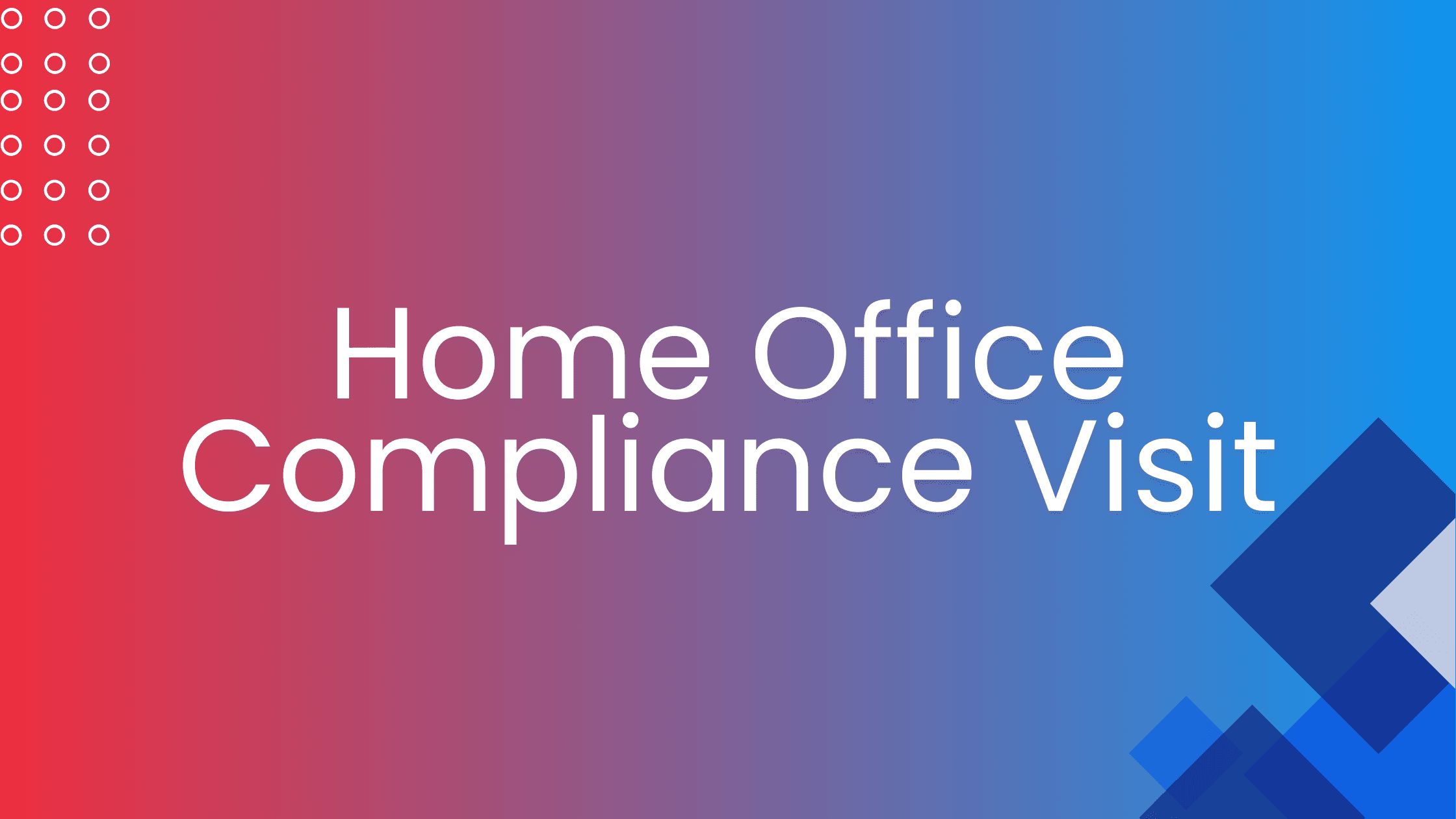
UK Home Office Compliance Visit
A Home Office sponsor compliance visit is an audit visit conducted by a Home Office official to a UK organisation that is sponsoring non-UK workers. A Home Office visit can happen before and after the organisation obtains a sponsor licence.
Why does the Home Office conduct a compliance Visit?
The purpose of the Home Office compliance visit is to ensure that the organisation is complying with its obligations as a sponsor and that sponsored employees are working in the sponsored company under their permitted stay.
How Home office Compliance visit works
Normally, organisations are given advance notice by the Home Office before a compliance visit occurs. This notification is usually sent by email to the designated key contact or Authorising Officer.
During the Home Office compliance visit, the Home Office official may ask to see the organisation's HR documents and processes related to their sponsorship duties, such as employee records, evidence of right-to-work checks, attendance records, and employment contracts. They may also ask to speak with sponsored employees to verify immigration compliance.
Pre-licence Home Office visit
Pre-licence compliance visit refers to the process of ensuring that an organisation meets the necessary requirements to obtain a sponsor licence.
During the pre-licence stage, the Home Office will review the organisation’s sponsor licence application and may conduct a compliance visit before making a decision on the sponsor licence application.
The organisation must demonstrate that they are genuine businesses operating legally in the UK and have robust HR systems in place to comply with sponsor duties.
Failure to comply with the requirements set out by the Home Office can result in a refusal to grant a sponsor licence.
Post-licence home office visit
Post-licence compliance refers to the ongoing obligations and responsibilities that an organisation must comply with after obtaining a sponsor licence from the Home Office.
Once an organisation is granted a sponsor licence, they are required to continue to meet the eligibility criteria and comply with the obligations set out by the Home Office. This includes factors such as ensuring that sponsored workers have the right to work in the UK, keeping up-to-date records of sponsored employees, and reporting any changes or updates to the Home Office.
To ensure compliance, organisations must have a robust HR systems in place to monitor and manage their sponsored employees. This includes regular record-keeping and reporting to the Home Office, conducting right-to-work checks, and complying with any other relevant immigration regulations.
Our Home Office Visit Services
We offer comprehensive Home Office Visit services to help you through the immigration process. Our experienced team will work with you to ensure that all necessary documents and information are prepared in advance of the visit, and we will provide guidance and support throughout the process. We specialise in a wide range of immigration cases, including family visas, work visas, and citizenship applications.
Our team can help you prepare for the visit by providing guidance on what to expect and helping you gather the required documents.
Choose WorkPermitCloud to prepare for your home office compliance visits
WorkPermitClous has extensive experience with the Home Office Visit process and we are committed to provide exceptional service to our clients. We have successfully assisted over 1000 clients in preparing their HR files to ensure confidence during home office visits, resulting in the successful granting of their sponsor licence. We understand the stress and anxiety that can come with the immigration process, and we are dedicated to making the process as smooth and stress-free as possible. Our team is highly knowledgeable and responsive, and we take pride in our track record of success in helping clients achieve their immigration goals.
If you have questions about our Home Office Visit services or would like to schedule a consultation, please don't hesitate to contact us. Our team is available to answer your questions and provid
...Right to Work Check
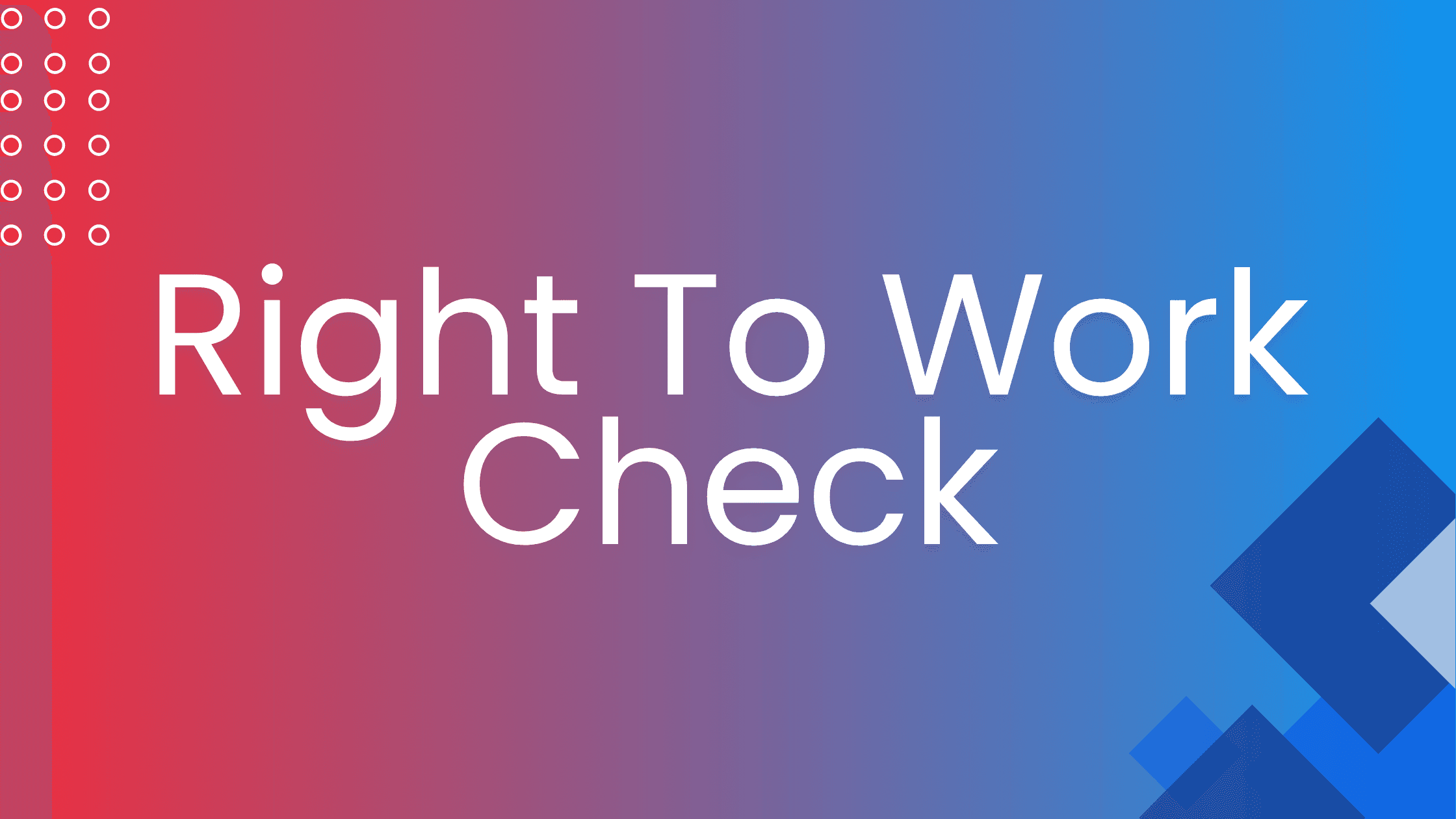
Right to Work Compliance in the UK
Are you navigating the complex terrain of Right to Work compliance? UK employers are legally obligated to conduct meticulous Right to Work checks on all employees to avoid substantial Home Office penalties. At Work Permit Cloud, we offer a comprehensive range of services, including training and consultancy, to empower employers in fulfilling their legal responsibilities.
Understanding Right-to-Work Compliance
Every company must verify and maintain evidence of each employee's legal eligibility to work in the UK. Employers who fail to adhere to these requirements may face substantial fines and other punitive actions. Even with a commitment to compliance, practical challenges can still lead to breaches and enforcement actions. Challenges may arise when striving for consistency in implementing Right to Work processes across organisations with multiple sites and a dynamic workforce. Additionally, interpreting extensive guidelines and keeping pace with ever-changing legislation from UKVI can be demanding.
Our Right to Work Solutions
The UK immigration specialists at Work Permit Cloud are here to provide comprehensive support for all aspects of immigration compliance, particularly Right to Work checks. We understand the intricacies and nuances of the process, making us your trusted partner in navigating this compliance landscape.
Types of Right-to-Work Checks
There are several ways to conduct a Right to Work check, each dependent on the employee's nationality and immigration status. These include:
Identity Service Provider Right-to-Work Checks:
These checks involve using an Identity Service Provider (IDSP) to digitally verify a worker's identity using Identity Document Validation Technology (IDVT). While IDSPs handle the verification process, employers must ensure the check's validity and securely retain the necessary data.
Online Right-to-Work Checks Using Share Codes:
This free Home Office service allows prospective employees to provide an alphanumeric code to verify their right to work. Employers can access this information in real-time, confirming the employee's eligibility to work in the UK.
Manual Document Right-to-Work Checks:
This process involves in-person checks using original documents from List A or B of acceptable documents. Employers must confirm the employee's eligibility, check document authenticity, and retain clear copies for record-keeping.
Employer Checking Service Right to Work Checks:
These checks apply when an employee has a pending application for further leave to stay in the UK. Employers must use the Employer Checking Service (ECS) to obtain a positive verification notice (PVN) to confirm the employee's right to work.
Follow-Up Right-to-Work Checks
Regular Right to Work checks are essential, not only for new hires but also for existing employees with time-limited work permissions. Follow-up checks are crucial to maintaining compliance and avoiding civil penalties.
Employer Considerations
The Immigration, Asylum, and Nationality Act 2006 mandates non-discriminatory Right to Work checks for all employees, regardless of nationality, length of service, or role. Employers must correctly categorise employees as List A or List B, with further subdivisions.
Stay Compliant with Work Permit Cloud
Work Permit Cloud specialises in supporting UK employers with Right to Work compliance. Our team of immigration experts and former Home Office employees offers guidance, assurance, and technology-assisted techniques to help you meet your compliance obligations. Our services include policy reviews, personnel record audits, training, and more. For expert assistance in navigating Right to Work compliance, please contact us.
...Civil Penalty
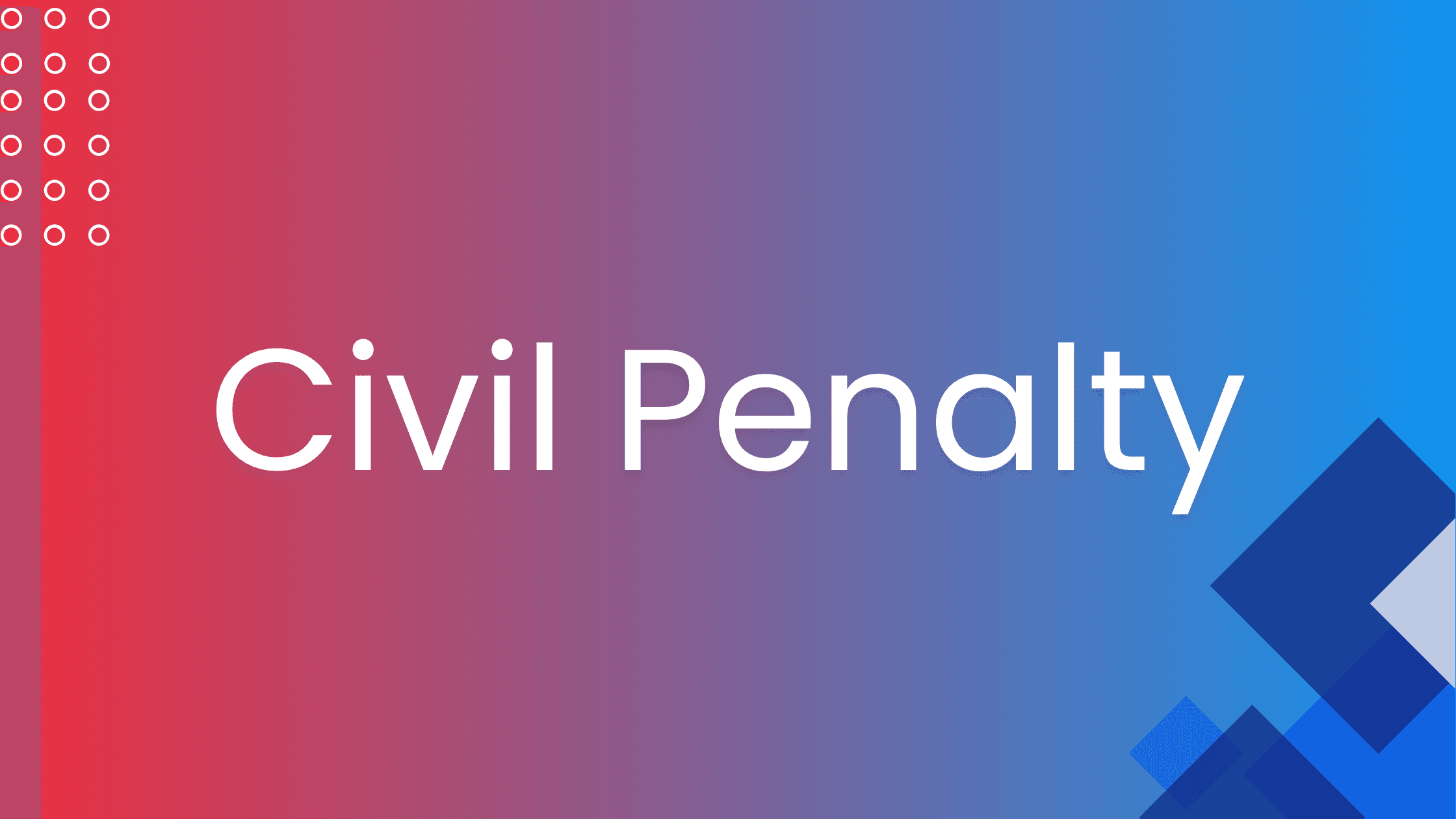
Compliance and Civil Penalty: Your Guide to Legal Employment Practices
Navigating Employment Compliance
Hiring employees in the UK comes with a set of rules and regulations, and understanding and adhering to these guidelines is crucial. One of the key aspects of employment compliance is ensuring that you employ individuals who have the legal right to work in the UK. Failure to do so can result in severe consequences, including civil penalties
What is a Civil Penalty?
A civil penalty is a financial penalty imposed on employers who are found to have employed a worker illegally. These penalties are enforced by the UK Home Office and can be a significant financial burden on businesses and organizations. The amount of the penalty can vary, but it is meant to deter employers from engaging in illegal employment practices.
Understanding Compliance Checks to avoid Civil Penalty
The Home Office conducts compliance checks to verify the eligibility of workers within your organization. If it is discovered that you have employed an individual who does not have the right to work in the UK, you may be subject to a civil penalty. Compliance checks can occur at any time, and it's essential to be prepared and proactive in ensuring your workforce is compliant.
How WPC Can Help
At Work Permit Cloud (WPC), we specialise in providing expert guidance on immigration and employment compliance. Here's how we can assist you:
Compliance Audits: We offer comprehensive audits of your current employment practices to identify and rectify any compliance issues.
Compliance Training: We provide training for your staff to ensure they are aware of their responsibilities and best practices for maintaining compliance.
Response to Penalties: If you find yourself facing a civil penalty, we can assist in responding to the Home Office and guide you through the process.
Ongoing Support: Our team provides ongoing support to help you stay compliant and navigate any compliance challenges that may arise.
Staying Compliant to avoid Civil Penalties
Compliance is not only a legal requirement but also essential for the reputation and success of your business. At WPC, we understand the complexities of employment compliance and the potential consequences of civil penalties. Our goal is to help you navigate these challenges and keep your organisation in good standing with the law.
Contact us today to learn more about compliance, civil penalties, and how we can assist you in maintaining a compliant workforce. Don't let legal issues jeopardize the success of your business.
Skilled Worker Visa

What is a Skilled Worker Visa?
The Skilled Worker visa is formerly known as a Tier 2 (General) visa. It allows you to come to or stay in the UK to do an eligible job with an approved employer who has a valid “Sponsor licence”. After 5 years you can apply for Indefinite Leave to Remain (ILR). Then after 12 months with ILR, you can become eligible to apply to naturalise as a British citizen and obtain a British passport.
For employers, the Skilled Worker route allows them to recruit people to work in the UK in a specific job be it from within the UK or overseas. UK companies need to have a “Sponsor Licence” before they can issue Skilled Work Visas to overseas employees.
What’re the requirements for a Skilled Worker Visa?
Under the skilled worker route, the applicant needs to prove:
A job offer from a licensed sponsor
To apply for a Skilled Worker Visa, you must have a job offer from a UK company with a valid “Sponsor License”. A Sponsor License is a license that gives UK employers permission to hire migrant workers from countries or regions outside of the UK, including EU nationals entering the UK from 1st January 2021. If you want to know which companies have sponsor licenses, please check all the approved licensed sponsors here.
In addition, you’ll need a Certificate of Sponsorship (COS) from your employer to apply for the Skilled Worker Visa, and the COS must include details on the role you've been offered in the UK.
Appropriate skill level requirement
Under the skilled worker route, the job you’re looking to fill needs to meet the required skill level - RFQ 3 or above (A-levels and equivalent). You can find all the eligible occupations for Skilled Worker Visa here.
Minimum Salary requirement
Apart from the skill level requirement, the job provided by the sponsor company must also meet the applicable minimum wage threshold. Whichever is the higher out of the following options:
- The general salary threshold is £26,200, or
- The "going rate" for the type of job you’re working.
...
Health Care Visa

What is a Health and Care Worker Visa?
According to the UKVI, a Health and Care Worker Visa allows medical professionals to enter / stay / work in the UK.
What are the requirements for a Health and Care Worker Visa?
must be a qualified doctor, nurse, health professional or adult social care professional
work in eligible jobs, the eligible occupation code for this visa can be found here
need to have a job offer from the NHS, or an organisation providing medical services to the NHS or an organisation providing adult social care
have a Certificate of Sponsorship (COS) from your employer
be paid a minimum annual salary of £20,480
meet the English language requirements, at least level B1 on the CEFR scale, more information about English language requirements can be found here.
What documents do you need to apply for a Health and Care Worker Visa?
COS (certificate of sponsorship from a company that's willing to sponsor you)
Passport with a minimum 6 months of validity
UKVI IELTS (General Training) if you are applying from outside the UK - Minimum 4 in each module (Reading, Writing, Listening, Speaking)
Health Care related Degree Certificate
TB test certificate (if you apply from outside the UK)
Police clearance certificate (if you apply from within the UK)
How much does it cost to apply for a Health and Care Worker Visa?
...Minister of Religion Visa
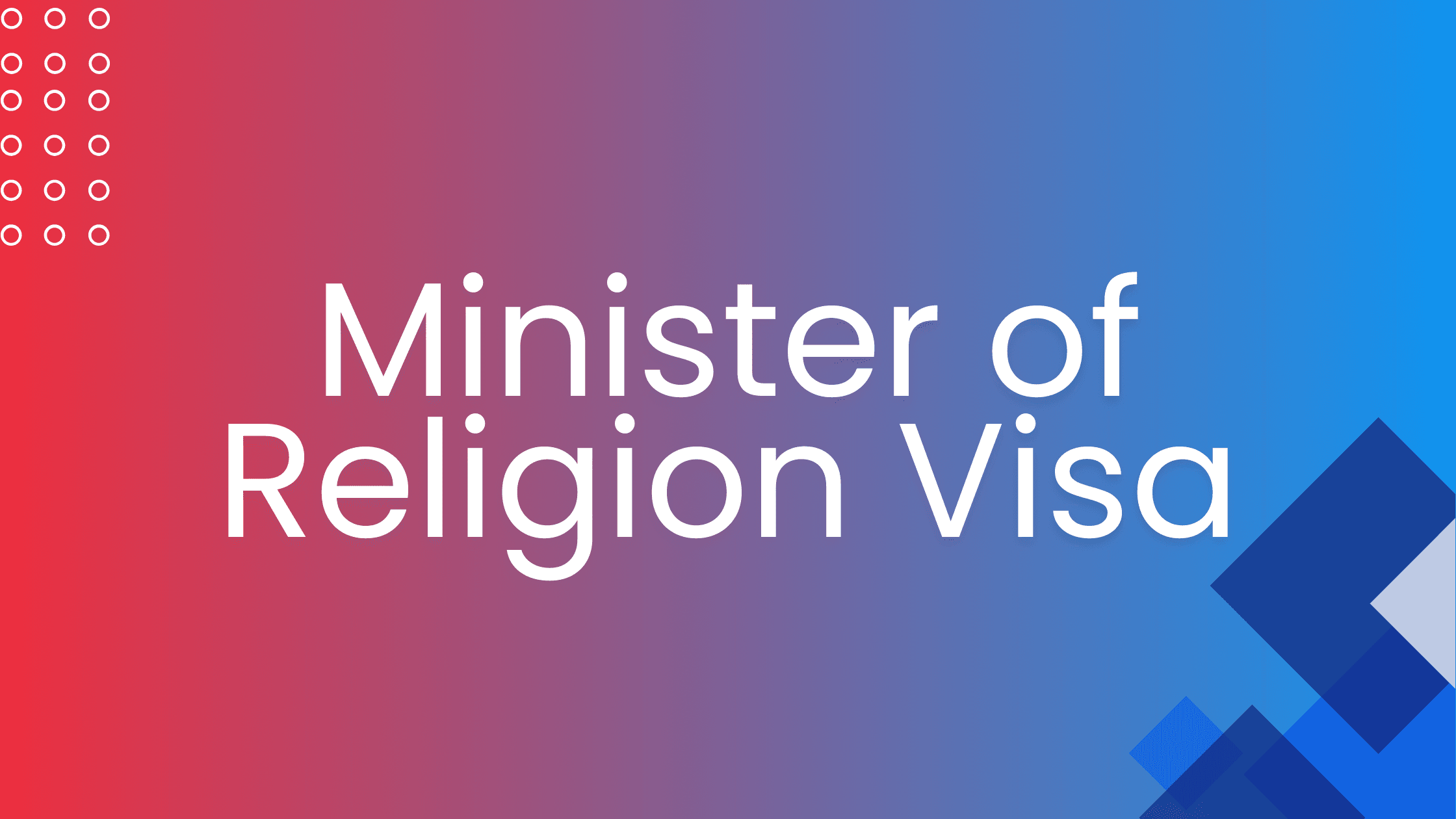
Are you a religious leader looking to serve your faith community in the UK?
The Minister of Religion Visa provides a pathway for individuals like you to fulfill your spiritual calling within the UK. This unique visa category is designed for those who play a vital role in religious institutions and communities, including ministers, missionaries, and members of religious orders.
Key Features of the Minister of Religion Visa
What are the Eligibility Requirements for the Minister of Religion Visa?
To qualify for a Minister of Religion Visa, you must meet the following requirements
- - Be 18 or over when you apply
- - You’ve been offered a job within a faith community (for example as a minister of religion, missionary, or member of a religious order) in the UK
- - Have a certificate of sponsorship for your job
- - Meet the English Language requirement B2 level
- - Have personal savings to support yourself in the UK
- - Show you can travel and your travel history over the last 5 years
- - Have a TB test certificate if you’re from certain countries
How long can you stay in the UK under the Minister of Religion Visa?
The Minister of Religion Visa typically allows you to stay for a maximum of up to 3 years and 1 month, or the time given on your certificate of sponsorship plus 14 days, whichever is shorter.
How long does it take to get a Minister of Religion Visa?
You should get a decision on your visa within 3 weeks when you apply from outside the UK.
What are the responsibilities for the Minister of Religion Visa?
As a religious worker, your primary responsibilities will involve performing religious duties, preaching, and providing spiritual guidance to your faith community.
Can you take Part-Time Work under the Minister of Religion Visa?
In some cases, you may be permitted to engage in part-time employment, although the majority of your time should be dedicated to religious duties.
How can WorkPermitCloud help?
The Minister of Religion Visa opens doors for religious leaders to share their faith and wisdom with communities in the UK. At WorkPermitCloud, we understand the importance of your calling and are committed to making your visa journey as smooth as possible. Whether you're a minister, missionary, or member of a religious order, our team is here to support you every step of the way.
Contact us today to learn more about the Minister of Religion Visa and how we can help you fulfill your spiritual mission in the UK.
Charity Worker Visa

Understanding the UK Charity Worker Visa
The UK Charity Worker Visa is designed for individuals who wish to work or volunteer for charitable organisations in the UK. It grants access to roles that directly contribute to charity work and social causes.
Eligibility Criteria for Charity Worker Visa
To be eligible for the UK Charity Worker Visa, applicants typically need to meet specific criteria:
you want to do unpaid voluntary work for a charity
be 18 or over when you apply
You must have a certificate of sponsorship from a licensed employer before you can apply to come to the UK to work.
have enough money to support yourself in the UK - you’ll usually need to have at least £1,270 available (unless you’re exempt)
The work you do in the UK must relate to the work of your sponsor organisation.
How long does it take to get a Charity Worker Visa
Once you’ve applied online, proved your identity and provided your documents, you’ll usually get a decision on your visa within:
3 weeks, if you’re outside the UK
8 weeks, if you’re inside the UK
How long you can stay under a Charity Work Visa
You can stay for up to 12 months or the time given on your certificate of sponsorship plus 14 days, whichever is shorter.
What you can and can not do under the Charity Worker Visa?
You can work for your sponsor in the job described in your certificate of sponsorship, do a second job in the same sector at the same level as your main job for up to 20 hours per week. You can also study, for some courses you’ll need an Academic Technology Approval Scheme certificate. bring your partner and children with you, if they’re eligible
You cannot receive any payment for work, take a permanent job and get public funds.
The Application Process for Charity Worker Visa
The application process for the UK Charity Worker Visa usually involves the following steps:
Online Application: Apply online, complete the necessary forms, and pay the application fee.
Biometrics: Attend a biometric appoint
Creative Worker Visa

Understanding the UK Creative Worker Visa
The UK Creative Worker Visa is designed for artists, performers, and creative professionals from around the world who wish to work in the UK's vibrant creative industries. It provides a platform for creative individuals to showcase their talents and contribute to the UK's thriving artistic scene.
Eligibility Criteria
To be eligible for the UK Creative Worker Visa, applicants typically need to meet specific criteria:
- 1. Certificate of Sponsorship: You should have an official certificate of sponsorship from a UK-based creative organization.
- 2. Genuine Talent: Demonstrating your genuine talent and recognition in the field is essential.
- 3. Financial Requirements: Proving that you can support yourself during your stay is a crucial part of the application process.
- 4. Tuberculosis Testing: Some applicants may be required to undergo tuberculosis testing.
The Application Process
The application process for the UK Creative Worker Visa usually involves the following steps:
- 1. Online Application: Apply online, complete the necessary forms, and pay the application fee.
- 2. Biometrics: Attend a biometric appointment at a visa application center.
- 3. Submission of Documents: Provide the required documents, including your certificate of sponsorship and financial evidence.
- 4. Interview: In some cases, you may need to attend an interview.
- 5. Decision and Visa Issuance: Await a decision on your application, and if successful, receive your UK Creative Worker Visa.
How WPC Can Help
WPC is your trusted partner in navigating the intricate process of obtaining the UK Creative Worker Visa. Here's how we can assist:
- 1. Certificate of Sponsorship Guidance: We can provide guidance on finding and securing sponsorship from recognized creative organizations in the UK.
- 2. Visa Application Support: WPC offers support with the application process, helping you complete the necessary forms and gather required documents.
- 3. Financial Planning: Ensuring you meet financial requirements is vital. WPC can provide financial planning assistance to ensure your financial readiness.
- 4. Ongoing Consultation: Our team provides ongoing consultation, addressing any questions or concerns you may have throughout the process.
Benefits of the UK Creative Worker Visa
The UK Creative Worker Visa offers numerous benefits, including:
- 1. Access to a dynamic and diverse creative industry in the UK.
- 2. The opportunity to showcase your artistic talents on an international stage.
- 3. Access to public services and healthcare during your stay.
- 4. The chance to contribute to and be inspired by the UK's creative and artistic community.
Conclusion
The UK Creative Worker Visa is your gateway to unleashing your creative potential on the global stage. By meeting the eligibility criteria and securing a certificate of sponsorship from a recognized creative organization, you can embark on a journey of artistic expression, professional growth, and cultural enrichment. The UK Creative Worker Visa is your key to sharing your creative gifts with the world and making a lasting impact on the UK's artistic landscape.
...Religious Worker Visa

Understanding the UK Religious Worker Visa
The UK Religious Worker Visa is designed for individuals who are committed to religious duties and wish to work within their faith communities in the United Kingdom. It offers religious workers the opportunity to serve, share, and contribute to the spiritual well-being of their congregation.
Eligibility Criteria
To be eligible for the UK Religious Worker Visa, applicants typically need to meet specific criteria:
1. Sponsorship: You should have an official certificate of sponsorship from a UK-based religious organization.
2. Religious Role: Demonstrating that you will perform religious duties as an ordained minister, missionary, or member of a religious order is essential.
3. Financial Requirements: Proving that you can support yourself during your stay is an integral part of the application process.
4. Tuberculosis Testing: Some applicants may be required to undergo tuberculosis testing.
The Application Process
The application process for the UK Religious Worker Visa usually involves the following steps:
1. Online Application: Apply online, complete the necessary forms, and pay the application fee.
2. Biometrics: Attend a biometric appointment at a visa application center.
3. Submission of Documents: Provide the required documents, including your certificate of sponsorship and financial evidence.
4. Interview: In some cases, you may need to attend an interview.
5. Decision and Visa Issuance: Await a decision on your application, and if successful, receive your UK Religious Worker Visa.
Benefits of the UK Religious Worker Visa
The UK Religious Worker Visa offers numerous benefits, including:
The opportunity to serve your faith community and contribute to its spiritual growth.
A platform to share your beliefs, practices, and values with a diverse and welcoming congregation.
Access to public services and healthcare during your stay.
Spouse Visa
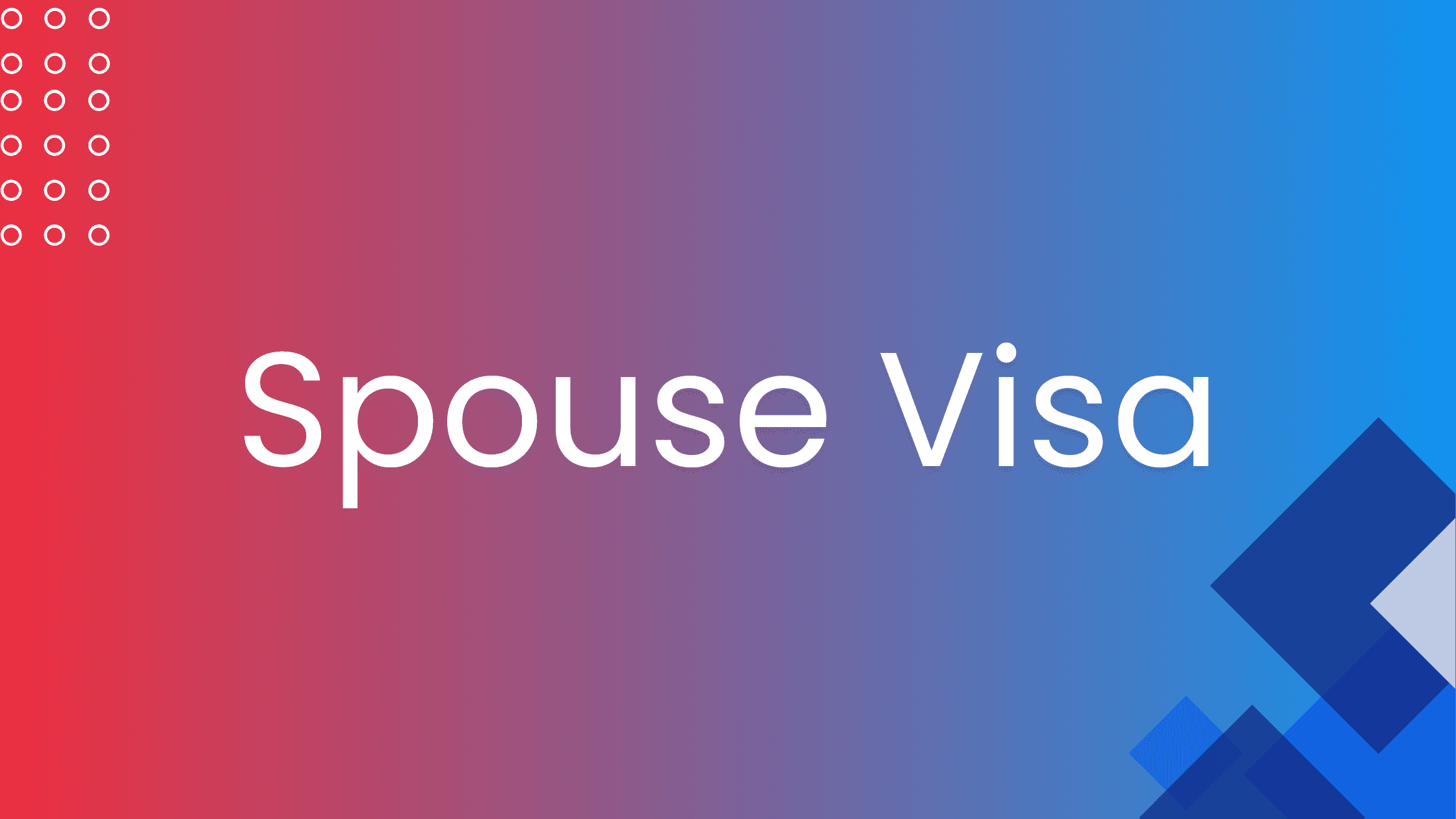
Understanding the Spouse Visa
The Spouse Visa is a part of the UKs family reunion scheme. It allows the spouses, civil partners, or unmarried partners of British citizens or settled persons to join their loved ones in the UK.
Eligibility Criteria for Spouse Visa
To be eligible for the Spouse Visa, applicants typically need to meet the following criteria:
- Relationship: You must be in a genuine and subsisting relationship with a British citizen or settled person.
- Financial Requirements: Meeting the financial threshold is crucial, and you will need to demonstrate that you can support yourselves without relying on public funds.
- English Language Proficiency: In most cases, you must prove your knowledge of the English language.
- Accommodation: You must have suitable accommodation for yourself and your partner.
- Health and Character: Applicants are required to meet health and character requirements.
The Application Process for Spouse Visa
The application process for the Spouse Visa typically involves the following steps:
- Online Application: Apply online, complete the necessary forms, and pay the application fee.
- Biometrics: Attend a biometric appointment at a visa application center.
- Submission of Documents: Provide necessary documents, including your marriage or civil partnership certificate, proof of your relationship, and financial evidence.
- Interview: In some cases, you may need to attend an interview.
- Decision and Visa Issuance: Await a decision on your application and, if successful, receive your Spouse Visa.
Benefits of the Spouse Visa
The Spouse Visa offers numerous advantages, including:
The ability to live and work in the UK with your loved one.
The potential for a path to settlement and British citizenship.
Access to public services and healthcare in the UK.
The opportunity to build a life together in one of the world's most diverse and culturally rich countries.
The Spouse Visa is a pathway for couples to be together and create a future in the United Kingdom. By meeting the eligibility criteria and providing evidence of your genuine relationship, you can embark on a journey of love, togetherness, and opportunity. The Spouse Visa is the key to uniting hearts across borders, allowing couples to build a life filled with love and shared dreams in the UK.
...
Unmarried Partner Visa

Understanding the Unmarried Partner Visa
The Unmarried Partner Visa is a category within the UK's family reunion scheme. It allows unmarried partners of British citizens or settled persons to join their loved ones in the UK.
Eligibility Criteria of the the Unmarried Partner Visa
To be eligible for the Unmarried Partner Visa, applicants typically need to meet specific criteria:
- 1. Relationship: You must prove that you are in a genuine, subsisting, and durable relationship with a British citizen or settled person.
- 2. Cohabitation: You and your partner should have been living together for at least two years in a relationship akin to marriage.
- 3. Financial Requirements: Demonstrating that you can support yourselves without relying on public funds is essential.
- 4. English Language Proficiency: In most cases, you must provide evidence of your English language skills.
- 5. Accommodation: You should have suitable accommodation for yourself and your partner.
- 6. Health and Character: Applicants are required to meet health and character requirements.
The Application Process of the Unmarried Partner Visa
The application process for the Unmarried Partner Visa generally involves the following steps:
- 1. Online Application: Apply online, complete the necessary forms, and pay the application fee.
- 2. Biometrics: Attend a biometric appointment at a visa application center.
- 3. Submission of Documents: Provide necessary documents, including proof of your relationship, financial evidence, and accommodation details.
- 4. Interview: In some cases, you may need to attend an interview.
- 5. Decision and Visa Issuance: Await a decision on your application, and if successful, receive your Unmarried Partner Visa.
Benefits of the Unmarried Partner Visa
The Unmarried Partner Visa offers numerous benefits, including:
- 1. The ability to live and work in the UK with your partner.
- 2. A potential path to settlement and British citizenship.
- 3. Access to public services and healthcare in the UK.
- 4. The opportunity to build a life together, sharing dreams and aspirations in a culturally diverse and vibrant country.
The Unmarried Partner Visa represents a lifeline for couples separated by international borders, enabling them to reunite and create a future together in the United Kingdom. By meeting the eligibility criteria and providing evidence of your genuine and committed relationship, you can embark on a journey of love, togetherness
Dependent Visa
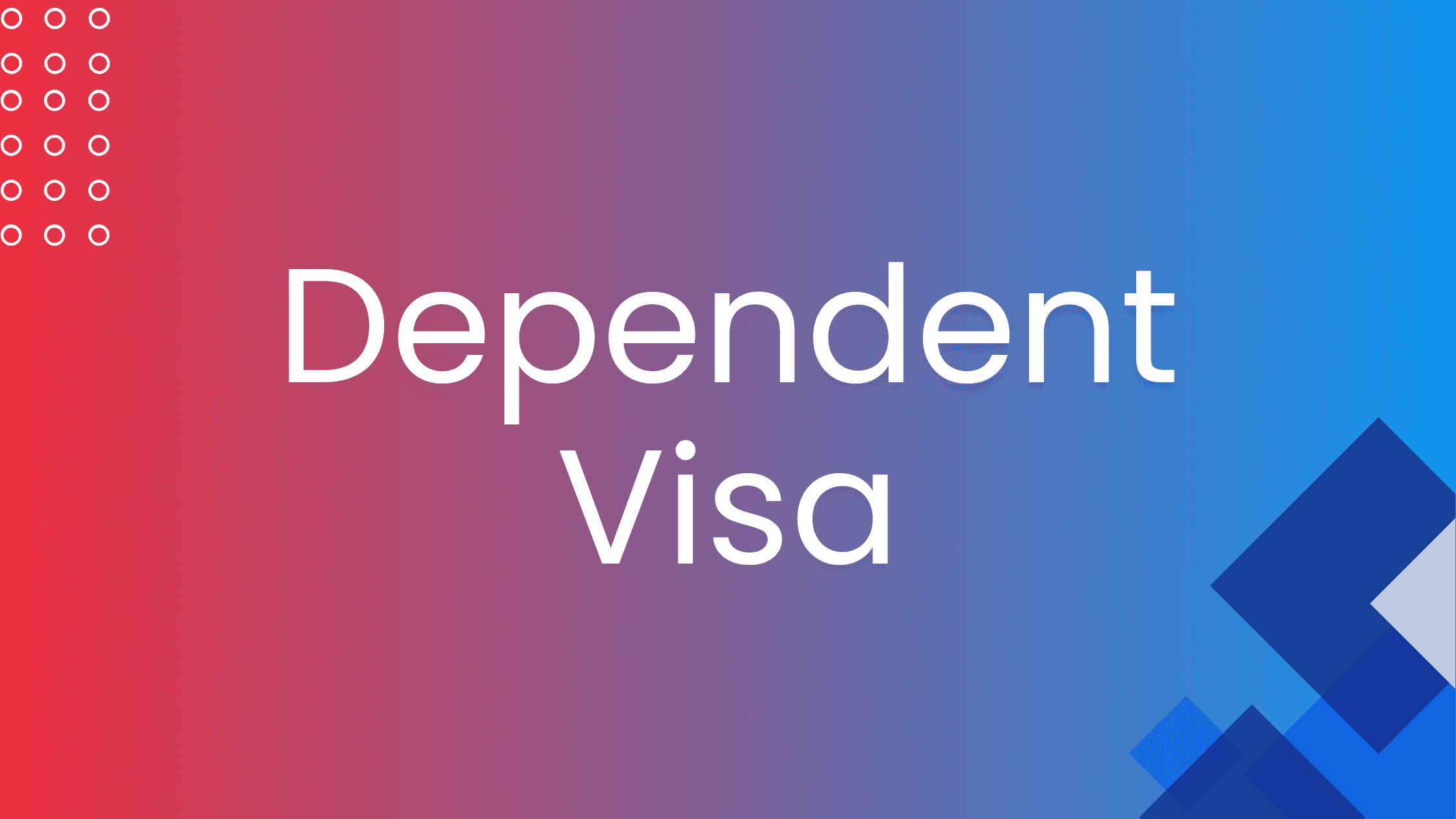
Bringing Families Together: Dependent of Skilled Worker Visa in the UK
When skilled professionals embark on new career opportunities in the United Kingdom, their families can join them through the Dependent of Skilled Worker Visa. In this article, we will explore the intricacies of this visa category, the eligibility requirements, and the journey it offers for families seeking to build a life together in the UK.
Understanding the Dependent of Skilled Worker Visa
The Dependent of Skilled Worker Visa is a part of the UKs Points-Based System (PBS), allowing family members of skilled workers to join them in the UK.
Eligibility Criteria
1. To be eligible for the Dependent of Skilled Worker Visa, applicants typically need to meet specific criteria:
- 2. Relationship: You must be the spouse, partner, or child of a skilled worker who holds a valid Skilled Worker Visa.
- 3. Sponsorship: The skilled worker must provide a Certificate of Sponsorship (CoS) as part of your application.
- 4. Financial Requirements: You may need to demonstrate that you can support yourself and your family without relying on public funds.
- 5. English Language Proficiency: In some cases, you may need to prove your knowledge of English.
The Application Process
The application process for the Dependent of Skilled Worker Visa usually involves the following steps:
- 1. Certificate of Sponsorship (CoS): The sponsoring skilled worker must provide a CoS, which is a vital document for your application.
- 2. Online Application: Complete an online application form, pay the application fee, and provide the required documentation.
- 3. Biometrics: Attend a biometric appointment at a visa application center.
- 4. Decision and Visa Issuance: Await a decision on your application, and if successful, receive your Dependent of Skilled Worker Visa.
Benefits of the Dependent of Skilled Worker Visa
The Dependent of Skilled Worker Visa offers numerous advantages, including:
The ability to live and work in the UK with your family. Access to public services and healthcare in the UK.The potential for a path to settlement.
The opportunity for your family to share in your career journey in a culturally diverse and vibrant country.
How can WPC help?
(WPC) is your trusted partner in navigating the complexities of dependent visa applications. Our dedicated team of experts provides comprehensive support, guiding you through the entire process. We ensure that all required documents are in order and offer personalized assistance to meet your unique needs. With our proficiency in immigration and sponsorship services, we make the dependent visa application process efficient and stress-free, helping you bring your loved ones to the United Kingdom with ease. Choose WPC for a smooth and successful dependent visa application journey.
...UK Expansion Worker visa
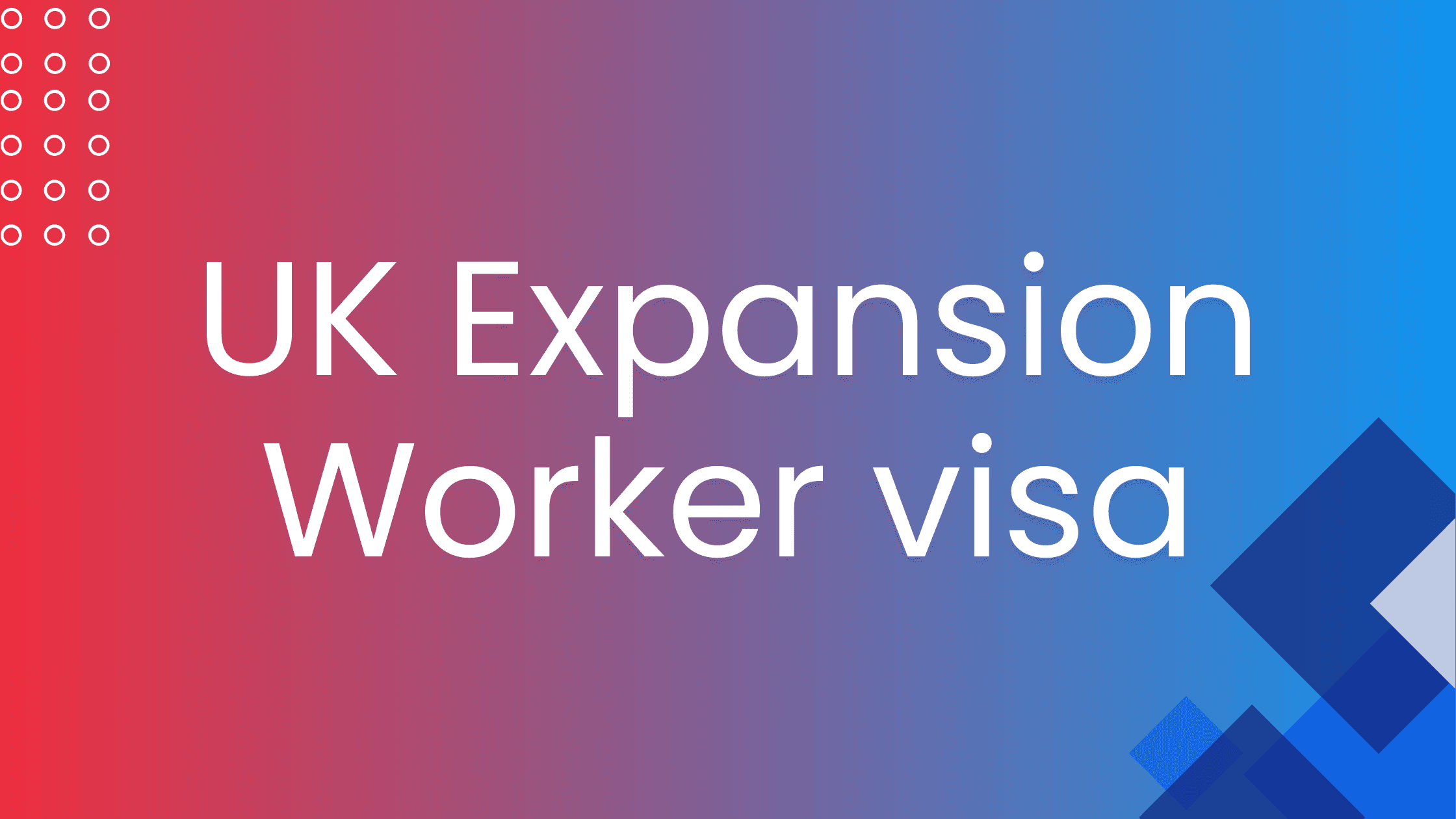
Understand UK Expansion Worker visa
The UK Expansion Worker visa is for a senior employee of an overseas business to come to the UK and set up a branch of an overseas business that has not started trading in the UK yet. This route has replaced the previous Sole Representative of an Overseas Business route.
For example, if a well-established Chinese company wants to expand their business in the UK and set up a UK branch, they can send a senior manager or specialist employee from their company to the UK. This person needs to apply for a UK Expansion Worker Visa.
To apply for a UK Expansion Worker visa, there’re requirements that both the overseas company and the candidates need to meet.
Requirements for the overseas company
The overseas company needs to:
1. Show proof of UK ‘footprint’, which means need to register a UK branch of the overseas company with the UK Companies House
2. Show the UK branch has not started trading in the UK yet
3. Show a detailed business plan for the expansion to the UK
4. Show evidence of the overseas company has been actively trading for 3 years
5. Show you have sufficient funds to support the UK branch for at least 2 years.
6. Apply for a Sponsor Licence for the UK branch to sponsor the UK expansion worker
However, the requirements and documents might differ depending on the nature of your overseas company. If you’re an overseas company that wants to send your employee to the UK to set up a UK branch, WorkPermitCloud can help analyse your case and provide you with a detailed document list that you need to prepare. If you also would like to learn more about Sponsor Licence application, please contact our Immigration experts.
UK Expansion Worker Visa Eligibility
To be eligible for a UK Expansion worker visa, the candidate must meet the following Eligibility criteria:
1. Must have already work for the overseas business as either a senior manager or specialist employee
2. have a valid Certificate of sponsorship (CoS) from your employer
3. have worked for your employer outside the UK for more than 12 months
4. must be paid at least £45,800 per year or the ‘going rate’ for your job - whichever is higher
5. do a job that’s on the list of eligible occupations
Documents required for UK Expansion Worker Visa
To apply for a UK Expansion Worker Visa, the documents the candidate needs to provide are:
1. the CoS reference number issued by your employer
2. evidence you’ve worked for your employer outside the UK
3. a valid passport (with more than 6 months validity)
4. your job title and annual salary
5. your job’s occupation code
6. the name of your employer and their sponsor licence number
7. proof of finance if you apply from outside the UK (you need to have £1,270 savings in your bank account for more than 28 days)
8. TB test report if you apply from outside the UK (if you’re from a listed country that requires a TB test)
9. a valid ATAS
...Specialist Worker Visa

Understanding the Senior or Specialist Worker Visa
The Senior or Specialist Worker Visa is a category within the UKs Points-Based System (PBS) that targets individuals with exceptional skills and expertise in their respective fields. It is designed to attract senior executives, industry specialists, and leaders who can significantly contribute to the UK economy.
Eligibility Criteria of the Senior or Specialist Worker Visa
To be eligible for the Senior or Specialist Worker Visa, applicants typically need to meet specific criteria:
- 1. Sponsorship: You must have a valid job offer from a UK employer that holds a Sponsor License.
- 2. Sponsorship Certificate: Your employer must issue a Certificate of Sponsorship (CoS) to support your application.
- 3. Salary Requirements: Your salary should meet the threshold for this visa category.
- 4. English Language Proficiency: Some applicants may need to demonstrate their proficiency in English.
- 5. Maintenance Funds: You might need to show that you have sufficient funds to support yourself.
The Application Process of the Senior or Specialist Worker Visa
The application process for the Senior or Specialist Worker Visa involves:
- 1. Certificate of Sponsorship (CoS): Your sponsoring employer will provide a CoS, which is an essential document for your application.
- 2. Online Application: Apply online, complete the necessary forms, and pay the application fee.
- 3. Biometrics: Attend a biometric appointment at a visa application center.
- Interview: In some cases, you may need to attend an interview.
- 4. Decision and Visa Issuance: Await a decision on your application and, if approved, receive your visa.
Benefits of the Senior or Specialist Worker Visa
The Senior or Specialist Worker Visa offers a range of benefits, including:
- 1. The opportunity to work for a reputable UK employer.
- 2. The ability to bring dependents to the UK.
- 3. Eligibility for settlement (Indefinite Leave to Remain) after a qualifying period.
- 4. Access to the UK's healthcare system and other public services.
The Senior or Specialist Worker Visa opens doors to the UK for experienced professionals and specialists seeking to make a meaningful impact on the country's workforce. By meeting the eligibility criteria and securing a valid job offer, you.
...Graduate Trainee Visa

Understanding the Graduate Trainee Visa
The Graduate Trainee Visa is a vital component of the UKs Points-Based System (PBS) designed to provide international graduates with the opportunity to enhance their skills and expertise by gaining practical work experience in the UK.
Eligibility Criteria of the Graduate Trainee Visa
To be eligible for the Graduate Trainee Visa, candidates typically need to meet specific criteria:
- Sponsorship: You must secure a valid job offer from a UK employer who holds a valid Sponsor License.
- Graduate Status: You should have completed a degree-level course in the UK.
- Employer Sponsorship Certificate: Your sponsoring employer must provide a Certificate of Sponsorship (CoS).
- Maintenance Funds: Demonstrating that you have adequate funds to support yourself in the UK may be required.
The Application Process of the Graduate Trainee Visa
The application process for the Graduate Trainee Visa usually involves the following steps:
- Certificate of Sponsorship (CoS): Your sponsoring employer will issue a CoS, a crucial document for your application.
- Online Application: Complete an online application form, pay the application fee, and provide required documentation.
- Biometrics: Attend a biometric appointment at a visa application center.
- Interview: In some cases, you may be called for an interview.
- Decision and Visa Issuance: Await a decision on your application and, if successful, receive your visa.
Benefits of the Graduate Trainee Visa
The Graduate Trainee Visa offers numerous benefits, including:
The opportunity to gain valuable work experience in the UK.
The ability to work for a reputable UK employer.
Eligibility to bring dependents to the UK.
The potential for career advancement and further work opportunities in the UK.
The Graduate Trainee Visa is your gateway to launching a successful career in the United Kingdom. By meeting the eligibility criteria and securing a valid job offer, international graduates can acquire valuable work experience and build a brighter future in the UK. Your journey to career growth begins with the Graduate Trainee Visa, providing you with the foundation for a prosperous professional life in the UK.
...
Tourist Visa

Understanding the UK Tourist Visa
The UK Tourist Visa, officially known as the Standard Visitor Visa, is designed for individuals who wish to visit the UK for leisure, tourism, or family visits. It provides a temporary entry into the country, allowing travelers to explore the UK's diverse offerings.
Eligibility Criteria
To be eligible for the UK Tourist Visa, applicants typically need to meet specific criteria:
1. Travel Purpose: You must visit the UK for tourism, leisure, or family visits.
2. Financial Sufficiency: You should have adequate funds to support yourself during your stay.
3. Travel History: You need to provide evidence of your travel history and intentions to return to your home country.
4. Accommodation: You should have arrangements for your accommodation in the UK.
The Application Process
The application process for the UK Tourist Visa usually involves the following steps:
1. Online Application: Apply online, complete the necessary forms, and pay the application fee.
2. Biometrics: Attend a biometric appointment at a visa application center.
3.Submission of Documents: Provide the required documents, including financial evidence and accommodation details.
4. Decision and Visa Issuance: Await a decision on your application, and if approved, receive your UK Tourist Visa.
Benefits of the UK Tourist Visa
The UK Tourist Visa offers numerous benefits, including:
Exploring historic sites, cultural attractions, and breathtaking landscapes.
Visiting friends and family residing in the UK.
Enjoying diverse cuisines, vibrant festivals, and world-class entertainment.
Access to public services and healthcare during your stay.
Business Visit

The UK Business Visit Visa is designed for entrepreneurs, investors, and business professionals who wish to explore business opportunities in the UK. It offers a short-term entry into the country for business-related activities. 1. Business Purpose: You must visit the UK for business meetings, conferences, or exploring investment opportunities. 2. Financial Sufficiency: You should have adequate funds to support your stay and cover business-related expenses. 3. Ties to Your Home Country: You must demonstrate your intention to return to your home country after your visit. 4. Invitation or Business Purpose: You may need to provide an invitation from a UK-based business or details of your business activities. 1. Online Application: Apply online, complete the necessary forms, and pay the application fee. 2. Biometrics: Attend a biometric appointment at a visa application center. 3. Submission of Documents: Provide the required documents, which may include invitations or proof of business activities. 4. Decision and Visa Issuance: Await a decision on your application, and if approved, receive your UK Business Visit Visa. Exploring business opportunities and networking in the UK. Attending business meetings, conferences, and trade fairs. Access to the vibrant UK business environment and potential investment prospects. Building valuable business connections and partnerships.Understanding the UK Business Visit Visa
Eligibility Criteria
To be eligible for the UK Business Visit Visa, applicants typically need to meet specific criteria:
The Application Process
The application process for the UK Business Visit Visa usually involves the following steps:
Benefits of the UK Business Visit Visa
The UK Business Visit Visa offers numerous benefits, including:
UK Fiancé Visa

The UK Fiancé Visa, also known as the Prospective Marriage Visa, is designed for individuals who wish to marry their British or settled partner in the United Kingdom. It grants the holder temporary entry to the UK to prepare for their wedding and future life together. 1. Relationship: You must be in a genuine and subsisting relationship with a British citizen or settled person. 2. Intention to Marry: You should intend to marry your partner within six months of entering the UK. 3. Financial Requirements: Demonstrating that you can support yourselves without relying on public funds is essential. 4. English Language Proficiency: In most cases, you must prove your knowledge of English. 1. Online Application: Apply online, complete the necessary forms, and pay the application fee. 2. Biometrics: Attend a biometric appointment at a visa application center. 3. Submission of Documents: Provide the required documents, including proof of your genuine relationship and financial evidence. 4.Interview: In some cases, you may need to attend an interview. 5. Decision and Visa Issuance: Await a decision on your application, and if successful, receive your UK Fiancé Visa. The opportunity to unite with your loved one and prepare for your wedding in the UK. Access to public services, healthcare, and other benefits. The potential for a path to further visas, such as Spouse Visa and settlement in the UK. The chance to start your married life together in a culturally diverse and vibrant country.Understanding the UK Fiancé Visa
Eligibility Criteria
To be eligible for the UK Fiancé Visa, applicants typically need to meet specific criteria:
The Application Process
The application process for the UK Fiancé Visa usually involves the following steps:
Benefits of the UK Fiancé Visa
The UK Fiancé Visa offers numerous benefits, including:
Student Visa

The UK Study Visa, officially known as the Student Visa, is designed for international students wishing to undertake education in the UK. It grants access to world-class education, research, and a vibrant cultural environment. 1. Course Offer: You must have an offer of a place on a course from a recognized educational institution. 2. Financial Requirements: Demonstrating that you can financially support yourself during your studies is crucial. 3. English Language Proficiency: Depending on your course and nationality, you may need to prove your English language proficiency. 4. Tuberculosis Testing: Some applicants may be required to undergo tuberculosis testing. 1. Online Application: Apply online, complete the necessary forms, and pay the application fee. 2. Biometrics: Attend a biometric appointment at a visa application center. 3. Submission of Documents: Provide the required documents, which may include your offer letter, financial evidence, and proof of English language proficiency. 4. Interview: In some cases, you may need to attend an interview. 5. Decision and Visa Issuance: Await a decision on your application and, if successful, receive your UK Study Visa. Access to world-class educational institutions and research facilities. The opportunity to work part-time during your studies and full-time during vacations. Access to public services, healthcare, and other benefits. The potential for a path to post-study work and settlement in the UK.Understanding the UK Study Visa
Eligibility Criteria
To be eligible for the UK Study Visa, applicants typically need to meet specific criteria:
The Application Process
The application process for the UK Study Visa typically involves the following steps:
Benefits of the UK Study Visa
The UK Study Visa offers numerous advantages, including:
Graduate Visa

The UK Graduate Visa, also known as the Post-Study Work Visa, is designed for international students who have completed a degree in the UK. It provides a two-year period during which graduates can live, work, and explore career opportunities in the UK. 1. Completion of a UK Degree: You must have successfully completed a degree from a recognized UK educational institution. 2. Valid Offer of Employment: To work in the UK, you should have a valid job offer. 3. Financial Requirements: You should be able to support yourself during your stay in the UK. Tuberculosis Testing: Some applicants may need to undergo tuberculosis testing. 1. Online Application: Apply online, complete the necessary forms, and pay the application fee. 2. Biometrics: Attend a biometric appointment at a visa application center. 3. Submission of Documents: Provide the required documents, which may include your degree certificate, job offer, and financial evidence. 4. Interview: In some cases, you may need to attend an interview. 5. Decision and Visa Issuance: Await a decision on your application and, if successful, receive your UK Graduate Visa. The opportunity to work and gain valuable work experience in the UK. The potential for career progression and growth. Access to public services, healthcare, and other benefits. The chance to explore long-term career opportunities in the UK.Understanding the UK Graduate Visa
Eligibility Criteria
To be eligible for the UK Graduate Visa, applicants typically need to meet the following criteria:
The Application Process
The application process for the UK Graduate Visa usually involves the following steps:
Benefits of the UK Graduate Visa
The UK Graduate Visa offers numerous advantages, including:
Child Student Visa

The Child Student Visa is designed for children between the ages of 4 and 17 who wish to pursue their education at a UK independent school. It allows young students to access quality education and experience the rich cultural diversity of the UK. 1. Offer of a Place: Your child must have an offer of a place at a UK independent school. Parental Consent: Parents or legal guardians must provide their consent for the child's travel and stay. 2. Financial Requirements: You should be able to financially support your child during their studies in the UK. 3. English Language Proficiency: Young learners may need to demonstrate their knowledge of the English language. 1. Online Application: Apply online, complete the necessary forms, and pay the application fee. 2. Biometrics: Your child may need to attend a biometric appointment at a visa application center. 3. Submission of Documents: Provide the required documents, which may include the offer letter from the school and financial evidence. 4. Decision and Visa Issuance: Await a decision on the application, and if successful, receive the Child Student Visa. Access to high-quality education at UK independent schools. An opportunity for cultural enrichment and exposure to a diverse environment. Access to public services and healthcare during their stay. The chance for your child to develop essential life skills and gain a global perspective.Understanding the UK Child Student Visa
Eligibility Criteria
To be eligible for the UK Child Student Visa, applicants typically need to meet specific criteria:
The Application Process
The application process for the UK Child Student Visa typically involves the following steps:
Benefits of the UK Child Student Visa
The UK Child Student Visa offers numerous benefits, including:
Innovator Founder Visa

Understanding the Innovator Founder Visa
Innovator Founder Visa route is for a person seeking to establish a business in the UK based on an innovative, viable and scalable business idea they have generated, or to which they have significantly contributed.
What are the requirements for an Innovator Founder Visa?
Must be 18 years old or above
Must have been issued with an endorsement letter by an endorsing body.
Your endorsement letter must be issued no more than 3 months before the date of your application.
Must have a key role in the day to day management and development of the business.
You must be able to show that your business idea is: new - you cannot join a business that is already trading; innovative - you must have an original business idea which is different from anything else on the market; viable - with potential for growth; scalable - you must give evidence of planning that includes creating jobs and growing into national and international markets
You need to have at least two Contact point meetings with the endorsing body at regular intervals
meet the English language requirement CEFR B2 level (equivalent to IELTS 5.5 in reading, writing, listening and speaking)
If you are applying from outside the UK, you’ll need financial proof to show you can support yourself in the UK, with at least £1,270 in your bank account for the last 28 days period.
How much does it cost to apply for an Innovator Founder Visa?
The fees include the Application Fee and Healthcare surcharge fee.
If you’re switching to this visa within the UK, you also need to pay £19.20 to have your biometric information (fingerprints and a photo) taken.
The fees for your dependants are the same.
Application Fee:
Self-Sponsorship In UK

Self Sponsorship Process & Requirements
WorkPermitCloud Limited has received numerous queries from talented people across the globe who aspire to work in the UK, but have difficulties in finding a sponsor. We would like to tell you that there’s another way that you can fulfil your career in the UK without relying on others. You can be your own sponsor, sounds exciting! All you need to do is to set up a business in the UK and apply for a sponsor licence to sponsor yourself. Previously, if you held more than a 10% shareholding of the company, you couldn't apply for a Tier 2 visa. However, since the Skilled Worker Visa scheme replaced the Tier 2 visa (Dec 2020), there are no restrictions on shareholdings anymore. This means you can come to the UK as a Skilled Worker even if you are the only shareholder.
Who is suitable for the Self-Sponsorship route?
1. You have a company in the UK; or
2. You’ve purchased a business in the UK, and you have sufficient resources (skills and finances) to support your business in the UK; or
3. You are planning to set up a business in the UK, and have the financial ability to do so.
What are the business requirements for self-sponsorship route?
There are no restrictions on the type of business for a self-sponsor, as long as it’s a legal business in the UK. You can open a coffee shop, restaurant, tech company etc. Unlike the Start-up Visa, you’ll need a business idea that needs to be different from any others in the market. You also need to have an endorsing body(universities, trusts, governing bodies) to approve your business idea.
Are there any financial requirements for self-sponsorship route?
There’s no exact number required for how much money you need to have for your business. As long as you have sufficient funds to support the establishment of the business.
How does it work?
First, set up a company in the UK
- Apply for a sponsor licence
- Get the sponsor licence and sponsor yourself
What do you need?
- A business in the UK
- The documents required for the Sponsor Licence application
- An Authorising Officer in the UK - A robust HR system
What’s the procedure of Self Sponsorship?
In summary, the procedure is to set up a business and apply for a sponsor license for your business and then sponsor yourself as a skilled worker. You can follow our step-by-step guide as below.
Step 1: Establish a business in the UK
To know how to start a business in the UK, please read the UK government website here.
Step 2: Apply for a Sponsor License There are certain documents required for a sponsor license application, you’ll need a minimum 4 of the following:
1. Minimum 1-month business bank statement
2. Copy of lease OR freehold OR tenancy agreement
3. Employer liability insurance certificate (minimum employee cover £5 million) 4. PAYEE OR Account Office reference letter from HMRC
5. Copy of regulatory approval, i.e., Health & Safety star rating for food business, ACCA, SRA
6. VAT Certificate (if registered)
7. SIGNED Annual accounts (if the business is over 18 months old)
If you want to know more about how to apply for a sponsor license, please read our blog here.
Step 3: Appointing an Authorising Officer
You must appoint an Authorising Officer (AO) during the application stage. The person needs to be your employee whom the Home Office will contact in regard to the application. Any suitable employee for this role, such as managers/directors, or employee with good communication skills who has knowledge of this application. It is better to appoint someone who is a British citizen or someone who has a Indefinate Leave to Remain (ILR) in the UK to act as your Authorizing Officer.
Step 4: Have a robust HR system in place
As a mandatory requirement for sponsor licence applications, you must have a robust HR system in place to prove that you are able to comply with the sponsor duties for your skilled workers. If you don’t have an HR system, WorkPermitCloud provides a one-stop solution, namely WpcHr software which is designed around the sponsor licence guidance from the Home Office. We have hundreds of clients who have managed to comply with the rules and have been issued with their licences and visas using our bespoke HR software.
Step 5: Getting your Sponsor Licence
It usually takes around 8 weeks to get a decision from the Home Office. However, it might take longer if the Home Office wants to conduct further checks on your business or wants to visit your company address. If you need assistance for preparing a Home Office visit, please contact us.
Step 6: Assigning a Certificate of Sponsorship (CoS) to a skilled worker
After your licence is granted, you're able to assign a CoS to an employee of the company that you wish to sponsor. For more info about CoS please click here. As there are no restrictions for the shareholdings of a skilled worker, you can assign a CoS to yourself, so that you can use the CoS to apply for a skilled worker visa. WorkPermitCloud can assist you with the CoS allocation and visa application.
Step 7: Applying for a Skilled Worker Visa
After you have assigned the CoS to yourself, you can use the CoS to apply for a Skilled Worker Visa. This Visa allows you to work in the UK legally. There are documents required for applying for a Skilled Worker Visa, please click here for more information.
How can WorkPermitCloud assist in your Self Sponsorship journey?
We can:
· Introduce you to business partners to help you set up a company such as, but not limited to, accounting firm, website development team, sales/marketing recommendation
· Provide advice on company business plan preparation Provide guidance on opening a business bank account
· Provide immigration advice on UK sponsor licence and work visa applications
· Prepare your company sponsor licence application bundle Provide advice and assist in prepare your company HR files
· Provide training for your Authorising Officer
· Prepare your Skilled Worker Application bundle Offering comprehensive, step-by-step guidance throughout your UK immigration journey.
Book our professional Immigration service at: info@workpermitcloud.co.uk
Turkish Businessperson Visa

The Turkish Worker Businessperson Visa is designed for Turkish nationals who wish to establish or join an existing business in the UK. This visa category offers a path to business ownership and entrepreneurship in the UK. 1. Turkish Nationality: You must be a Turkish national. 2. Business Activity: You should be planning to set up a new business, become a partner in an existing business, or take over an established business. 4. Financial Requirements: Demonstrating that you have the financial means to support your business venture and yourself is crucial. 5. English Language Proficiency: In most cases, you must prove your knowledge of the English language. 1. Online Application: Apply online, complete the necessary forms, and pay the application fee. 2. Biometrics: Attend a biometric appointment at a visa application center. 3. Submission of Documents: Provide the required documents, which include a comprehensive business plan and financial evidence. 4. Interview: In some cases, you may need to attend an interview. 5. Decision and Visa Issuance: Await a decision on your application and, if approved, receive your Turkish Worker Businessperson Visa. The opportunity to establish or join a business in the UK. Access to public services and healthcare in the UK. A potential path to settlement. The chance to embark on a new business venture in a vibrant and dynamic economic environment.Understanding the Turkish Worker Businessperson Visa
Eligibility Criteria
To be eligible for the Turkish Worker Businessperson Visa, applicants typically need to meet specific criteria:
The Application Process
The application process for the Turkish Worker Businessperson Visa typically involves the following steps:
Benefits of the Turkish Worker Businessperson Visa
The Turkish Worker Businessperson Visa offers numerous advantages, including:
How WPC Can Help
Navigating the complex process of establishing a business in the UK can be challenging. WPC offers expert assistance to Turkish nationals in the following ways:
Scale-up Visa

Understanding the Scale-up Visa
The Scale-up visa scheme is to attract highly skilled individuals from overseas to work for scale-up businesses in the UK.
The aim of this scheme is to support fast-growing businesses in the UK and contribute to boosting the UK’s economy.
What are the requirements for a Scale-up Visa?
have a job offer from a scale-up company
have a certificate of sponsorship (CoS) from a Scale-up Sponsor
do a job that’s on the list of eligible occupations
be paid at least £34,600 or the going rate for your job
English B1 level
What documents do you need to apply for a Scale-up Visa?
COS (certificate of sponsorship from a Scale-up company who's willing to sponsor you)
Passport with minimum 6 months of validity
UKVI IELTS (General Training) if you are applying from outside the UK - Minimum 4 in each module (Reading, Writing, Listening, Speaking)
Financial proof if you're applying outside of the UK (£1270 in your bank account for more than 28 days)
TB test report (if you're from the list of countries that require a TB test and apply from outside the UK)
In the 3 year period immediately before they were approved by the Home Office to sponsor scale-up workers, they must have: had at least 10 employees at the start of the 3 year period grown by 20% on average in each year in either employment or total sales (turnover) For Scale-up visa applicants, you only need to pay the visa application fee, and the Immigration Health Surcharge for the number of years you're staying.Requirement for the Scale-up Business
How much does it cost to apply for a Scale-up Visa?
Scale-up Sponsor Licence

What is the Scale-up route?
According to the Home Office, the Scale-up route is for talented individuals to work for a UK Scale-up Sponsor, who have the skills needed to enable the Scale-up business to continue growing. The individual must have a high-skilled job offer at the required salary level from a qualifying Scale-up business.
Who can sponsor someone under a Scale-up Visa?
To sponsor someone under a Scale-up Visa, the company must be a scale-up business, and the company must have a sponsor licence for the scale-up route.
What is a Scale-up Business?
A Scale-up Business is a company that:
had at least 10 employees at the beginning of the 3 year period
and, grown by 20% on average each year in either employment or total sales (turnover) in the last 3 years
If your company qualifies as a scale-up business, then you can apply for a sponsor licence under the scale-up route, WorkPermitCloud Limited can assist with this, please contact us.
If your company does not meet the requirements to be considered a scale-up business, you can still apply for a sponsor licence through one of the other routes, such as the skilled worker routes, to hire talents from overseas.
How to apply for a Scale-up Sponsor Licence?
You can apply for a Scale-up Sponsor Licence by completing the sponsor licence application form online, paying the relevant application fee, and submitting any required supporting evidence or information. If you already hold a valid sponsor licence to sponsor workers, you can apply to add the Scale-up route to your existing licence on SMS. Organisation applying to be licenced under scale-up route need to: be eligible as a scale-up business apply by completing the online application form submitting the supporting documents (if you’re required)Requirements for scale-up Sponsor licence application
Scale up Business

A Scale-up Business is a company that: had at least 10 employees at the beginning of the 3 year period and, grown by 20% on average each year in either employment or total sales (turnover) in the last 3 years What is the Scale-up route? According to the Home Office, the Scale-up route is for talented individuals to work for a UK Scale-up Sponsor, who have the skills needed to enable the Scale-up business to continue growing. The individual must have a high-skilled job offer at the required salary level from a qualifying Scale-up business. To sponsor someone under a Scale-up Visa, the company must be a scale-up business, and the company must have a sponsor licence for the scale-up route. If your company qualifies as a scale-up business, then you can apply for a sponsor licence under the scale-up route, WorkPermitCloud can assist with this, please contact us. If your company does not meet the requirements to be considered a scale-up business, you can still apply for a sponsor licence through one of the other routes, such as the skilled worker routes, to hire talents from overseas.What is a Scale-up Business?
Who can sponsor someone under a Scale-up Visa?
Compliant HR Software
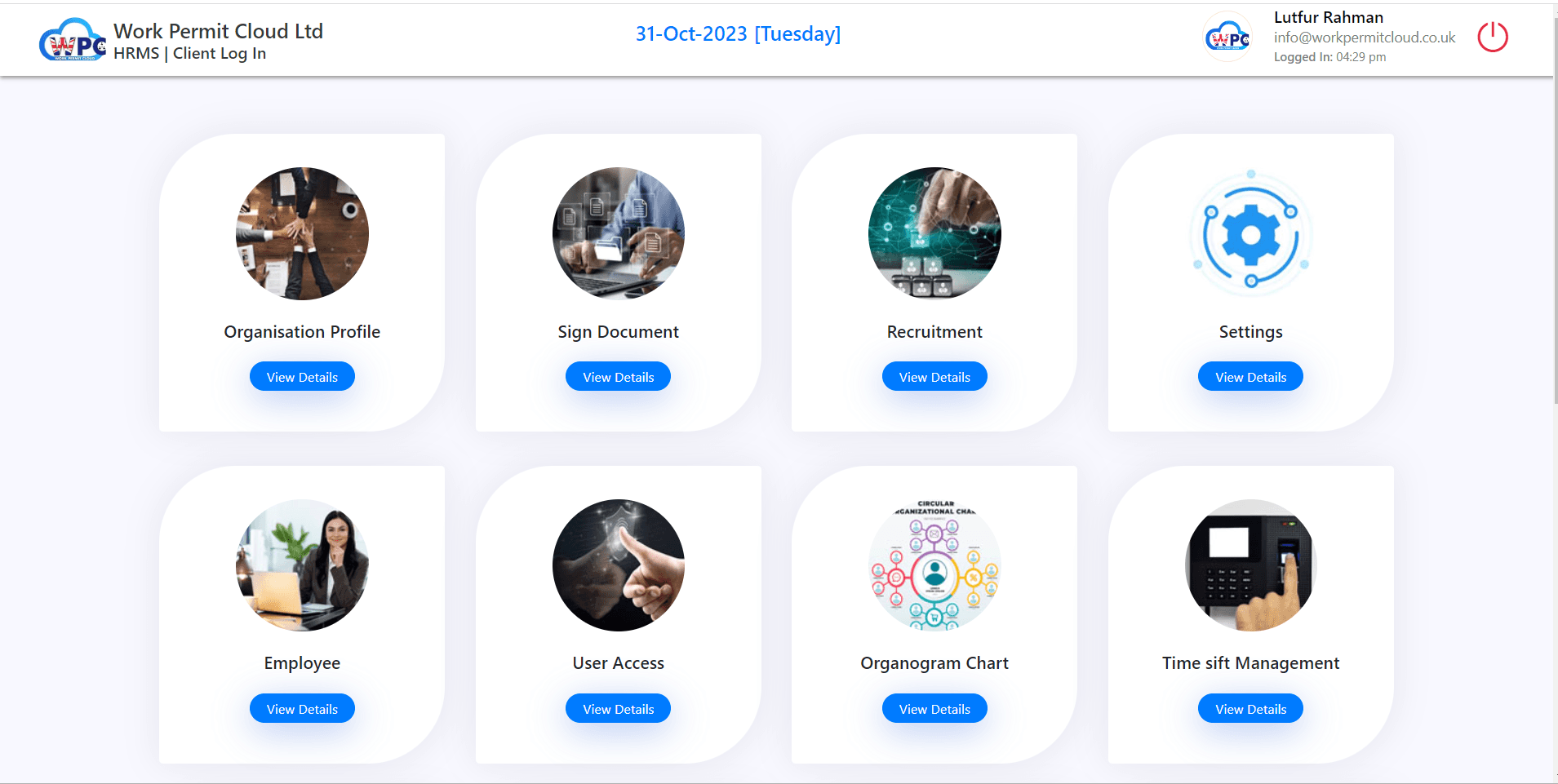
State-Of-The-Art Cloud HR Software For Businesses
WorkPermitCloud is an innovative legal and HR-tech company that specialises in business immigration and HR systems in the UK.
What is an HR management system?
A human resources management system helps organisations manage their human resources, such as employee records, payroll, performance, and compliance with UKVI rules. This system is designed to make HR processes simpler and more efficient while ensuring the accessibility of all relevant information in one place.
How Does an HRMS Work?
Cloud HR software consists of a centralised database that stores employee records. Authorised personnel can access this database through web browsers or mobile phones. The system also includes various tools to help manage employee records like performance review templates, contract management tools and absence tracking.
Who uses it? / Why do you need an HR Management System?
Human Resource Management Systems offer several advantages for organisations. Perhaps the most significant benefit is that they can help save time and money by automating HR processes. They can help improve compliance with UKVI sponsorship rules and provide a centralised location for all employee records.
As a UK employer, if you're sponsoring migrant workers from overseas, it is a requirement from the Home Office that you must have a robust HR system in place to monitor your employees. As a licensed sponsor, you need to carry out sponsor duties, which require record-keeping and reporting. A robust HR system will help you to comply with your duties in order to maintain your sponsor licence. Failing to comply with your sponsor duties may result in your sponsorship licence being suspended, revoked or withdrawn.
Manage your Sponsorship Licence with WpcHr Software
With our Cloud-based HR software, employers can manage their employees' database and monitor and create all kinds of reports related to settled or non-settled workers. For example, right-to-work checks, record changes of circumstances, proof of ID, next of kin details, duty roster, holiday, sick leave, absence, role management and alert management. Strong adherence to these HR processes helps organisations to follow Home Office guidance of sponsorship compliance. All these functionalities can be accessed by end-users through a web browser or mobile phone. Our specialist team supports employers to harness the full benefits of the specialised software and its functionalities.
Choosing an HRMS for Your Business
When choosing a cloud HR software for your business, it is crucial to consider your specific needs. WorkPermitCloud’s software meets the requirements of companies of all sizes. Reach out to our team to discuss your particular requirements and find out more about our services.
What does our HRMS Software Service include?
Sponsorship Compliance
Right to Work Check
Recruitment Automation
Employee Database
Attendance Geo-Location System
Leave & Holiday Management
Job Rota Management
Dashboard Report
...HO Compliance Audit in UK
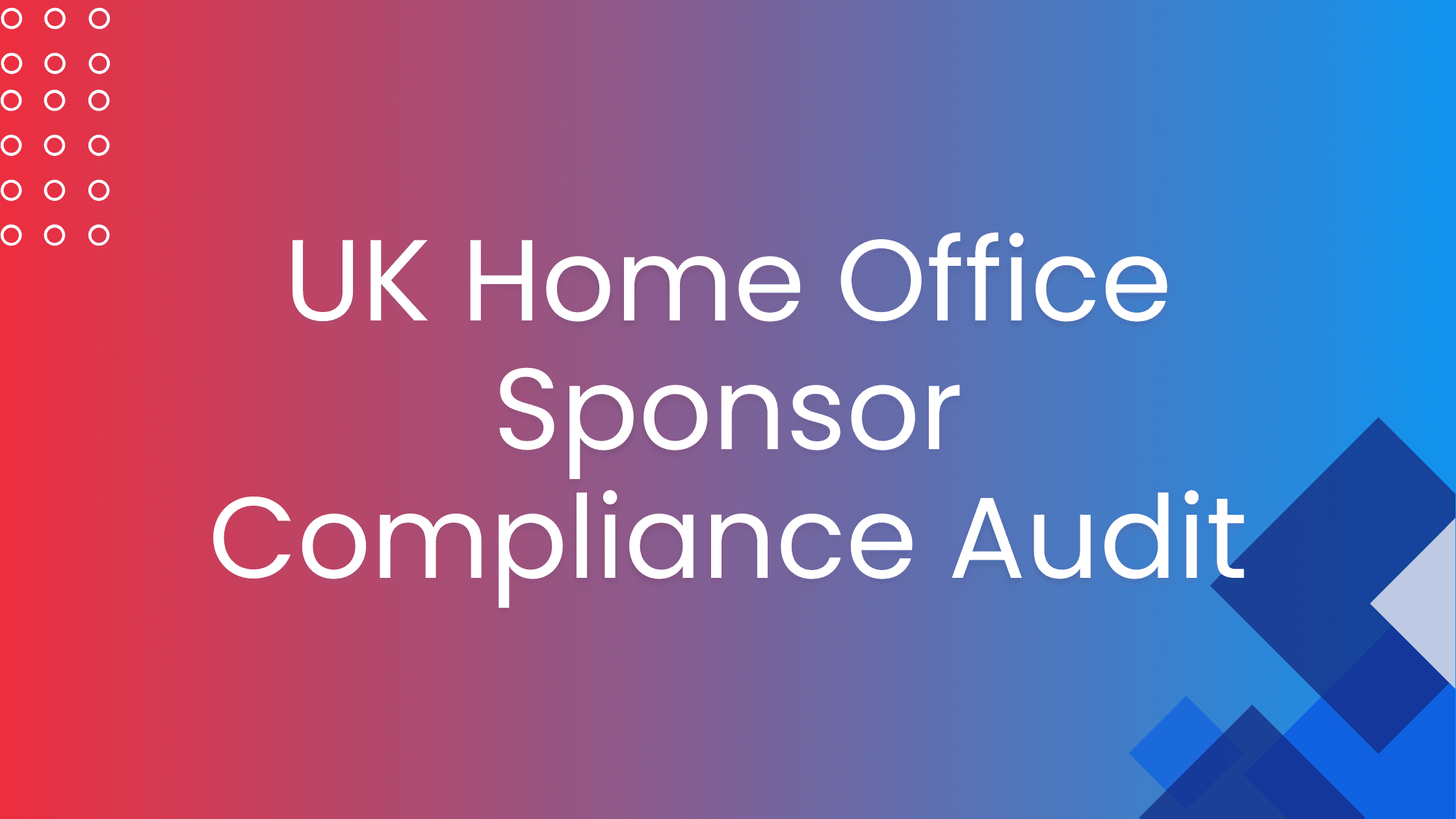
UK Home Office Sponsor Compliance Audit
A Home Office sponsor compliance visit is an audit visit conducted by a Home Office official to a UK organisation that is sponsoring non-UK workers. A Home Office visit can happen before and after the organisation obtains a sponsor licence.
Why does the Home Office conduct a compliance Visit?
The purpose of the Home Office compliance visit is to ensure that the organisation is complying with its obligations as a sponsor and that sponsored employees are working in the sponsored company under their permitted stay.
How Home office Compliance visit works
Normally, organisations are given advance notice by the Home Office before a compliance visit occurs. This notification is usually sent by email to the designated key contact or Authorising Officer.
During the Home Office compliance visit, the Home Office official may ask to see the organisation's HR documents and processes related to their sponsorship duties, such as employee records, evidence of right-to-work checks, attendance records, and employment contracts. They may also ask to speak with sponsored employees to verify immigration compliance.
Pre-licence Home Office visit
Pre-licence compliance visit refers to the process of ensuring that an organisation meets the necessary requirements to obtain a sponsor licence.
During the pre-licence stage, the Home Office will review the organisation’s sponsor licence application and may conduct a compliance visit before making a decision on the sponsor licence application.
The organisation must demonstrate that they are genuine businesses operating legally in the UK and have robust HR systems in place to comply with sponsor duties.
Failure to comply with the requirements set out by the Home Office can result in a refusal to grant a sponsor licence.
Post-licence home office visit
Post-licence compliance refers to the ongoing obligations and responsibilities that an organisation must comply with after obtaining a sponsor licence from the Home Office.
Once an organisation is granted a sponsor licence, they are required to continue to meet the eligibility criteria and comply with the obligations set out by the Home Office. This includes factors such as ensuring that sponsored workers have the right to work in the UK, keeping up-to-date records of sponsored employees, and reporting any changes or updates to the Home Office.
To ensure compliance, organisations must have a robust HR systems in place to monitor and manage their sponsored employees. This includes regular record-keeping and reporting to the Home Office, conducting right-to-work checks, and complying with any other relevant immigration regulations.
Our Home Office Visit Services
We offer comprehensive Home Office Visit services to help you through the immigration process. Our experienced team will work with you to ensure that all necessary documents and information are prepared in advance of the visit, and we will provide guidance and support throughout the process. We specialise in a wide range of immigration cases, including family visas, work visas, and citizenship applications.
Our team can help you prepare for the visit by providing guidance on what to expect and helping you gather the required documents.
Choose WorkPermitCloud to prepare for your home office compliance visits
WorkPermitClous has extensive experience with the Home Office Visit process and we are committed to provide exceptional service to our clients. We have successfully assisted over 1000 clients in preparing their HR files to ensure confidence during home office visits, resulting in the successful granting of their sponsor license. We understand the stress and anxiety that can come with the immigration process, and we are dedicated to making the process as smooth and stress-free as possible. Our team is highly knowledgeable and responsive, and we take pride in our track record of success in helping clients achieve their immigration goals.
Pricing of home office visit
...Sponsorship Duties

What are the Sponsorship duties once an organisation obtains a sponsorship licence?
Once your sponsorship licence is obtained, there are duties that the sponsor needs to follow which is required by the Home Office. As a licensed sponsor, it is important to comply with these in order to maintain your sponsor licence. If you fail to comply with the duties, your sponsorship licence may be suspended, revoked, or withdrawn.
According to “Workers and Temporary Workers: guidance for sponsors part 3”, your duties are as follows:
1. Reporting duties
You must report to the Home Office of certain events and information about your company and the migrant workers you’re sponsoring by using the Sponsor Management System (SMS). There are also certain time limits set for reporting different events and information.
Within 10 working days, you should report:
- If the migrant worker you’re sponsoring does not show up at work on their first day of work
- If the migrant worker you’re sponsoring is absent from work for more than 10 working days, without permission
- If there are changes on the migrant workers you’re sponsoring, for example
- Change of the employment contract or service contract
- resignation and dismissal a promotion or change in job title or core duties
- a decrease in salary from the level stated on their CoS (Certificate of Sponsorship) a change of location of the employment
- If you stop sponsoring a worker for any reason
- If your company size changes from small to large or vice versa
Within 20 working days, you should report:
- If there are changes in your organisation. Such as:
- Change of company name or branch of company name
- Merge, acquisition or change of ownership
- Stop trading or enter bankruptcy proceedings
- Significantly change the nature of your business
- Are convicted of a related offence according to Home Office file Annex L4 of Part 1: Apply for a licence
2. Record-keeping duties
You should keep records of certain documents for every sponsored migrant worker, either in paper or electronic form. According to the Sponsor guidance Appendix D from the Home Office, the main documents you must keep records of are:
- A copy of each sponsored migrant worker’s passport, Biometric Residence Permit (BRP), National Insurance (NI) number, evidence of the date of entry to the UK (where relevant) and their proof of address.
- A history of contact details (UK residential address, email, telephone number) of each sponsored migrant worker. This must be kept up to date at all times.
- A record of the migrant worker’s absence
- Any documents relating to your sponsored migrant workers, or the operation of your company that are relevant to assessing your compliance with your sponsoring responsibilities (e.g. documents related to recruitment practice, HR system processes etc).
If you keep records in electronic form, you need to make sure that all the important sections of the document are accessible. The record-keeping must meet all legal requirements set by the Home Office.
There are more advantages to keeping records electronically than paper, it saves storage space and it is easier to update any information. In order to do a good job on record-keeping duties, a robust HR management system must be implemented for your company. Crucially, all employees’ information must be kept up to date. If an employer fails to attain a proper HR system, the sponsor licence is at risk of being suspended.
In addition to the two main duties listed above, you must also comply with Immigration law and wider UK law, and not perform any conduct in a manner that is not conducive to the wider public good, for more details please click here.
A business’s HR system is still regulated and checked even after a sponsor licence is granted. As a licensed sponsor, you must be prepared to have all necessary checks in place and follow the duties. For example, one restaurant failed to meet the Home Office guidelines, because they did not have a robust system in place to meet duties in relation to maintaining migrant contact details. Many more similar cases failed to comply with sponsor duties due to the improperly kept nature of HR files. This demonstrates the importance of having a robust HR system.Having a seamless HRMS software is essential
EU Pre-Settled Status
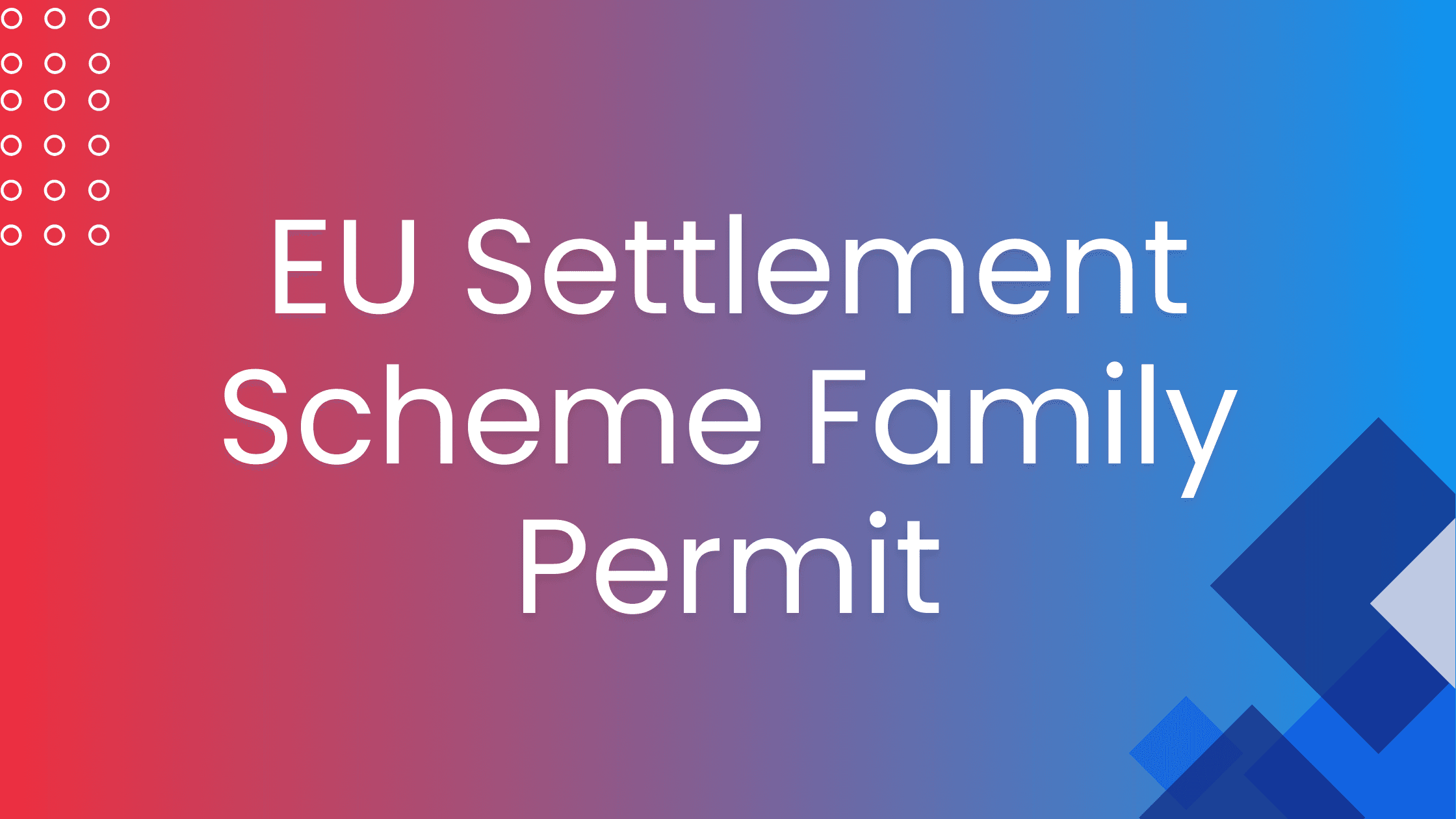
EU Settlement Scheme pre-settled status
Unlocking the EU Settlement Scheme: Pre-Settled Status Explained
The United Kingdom's departure from the European Union brought about significant changes, and one of the most crucial aspects for EU, EEA, and Swiss citizens residing in the UK is the EU Settlement Scheme. Within this scheme, one of the statuses you can obtain is Pre-Settled Status. This blog will provide you with an in-depth understanding of Pre-Settled Status, its implications, and how it can be a stepping stone to securing your long-term future in the UK.
Pre-Settled Status is a temporary immigration status granted under the EU Settlement Scheme. It is designed for individuals who have not yet accumulated five years of continuous residence in the UK by the specified deadline. Temporary Status: Pre-Settled Status allows you to continue living and working in the UK for up to five years. Limited Access to Benefits: With Pre-Settled Status, you have access to the same healthcare, employment, and education benefits as before. However, you may have more limited access to certain public funds. Flexibility: You are free to leave and re-enter the UK, as long as you maintain your continuous residence. Eligibility for Pre-Settled Status: To qualify for Pre-Settled Status, you must be an EU, EEA, or Swiss citizen living in the UK before the end of the Brexit transition period (31 December 2020). The beauty of Pre-Settled Status is that it can be a stepping stone to Settled Status. After accumulating five years of continuous residence, you can apply to switch to Settled Status, which offers you the right to stay in the UK indefinitely.What Is Pre-Settled Status?
Key Features of Pre-Settled Status:
Moving from Pre-Settled to Settled Status:
How WPC Can Assist You:
At Work Permit Cloud (WPC), we specialize in immigration solutions, including support for the EU Settlement Scheme. Here's how we can assist you:
1. Application Guidance: We provide comprehensive guidance on the application process, ensuring that you provide all necessary documentation.
2. Status Transition: If you are nearing your five-year mark and want to transition to Settled Status, we can assist with that process.
3. Compliance: We offer advice on maintaining compliance with your Pre-Settled Status and meeting the continuous residence requirements.
Secure Your Future in the UK
Pre-Settled Status is your gateway to continued life in the UK. It provides you with the freedom to work, study, and access essential services while you build your continuous residence. Whether you're a newcomer or someone who has been in the UK for years, understanding and securing your status is paramount.
Contact us at WPC to learn more about the EU Settlement Scheme, Pre-Settled Status, and how we can assist you in securing your future in the UK. Don't miss the opportunity to ensure your continued life in this vibrant and diverse nation.
...
EU Settled Status
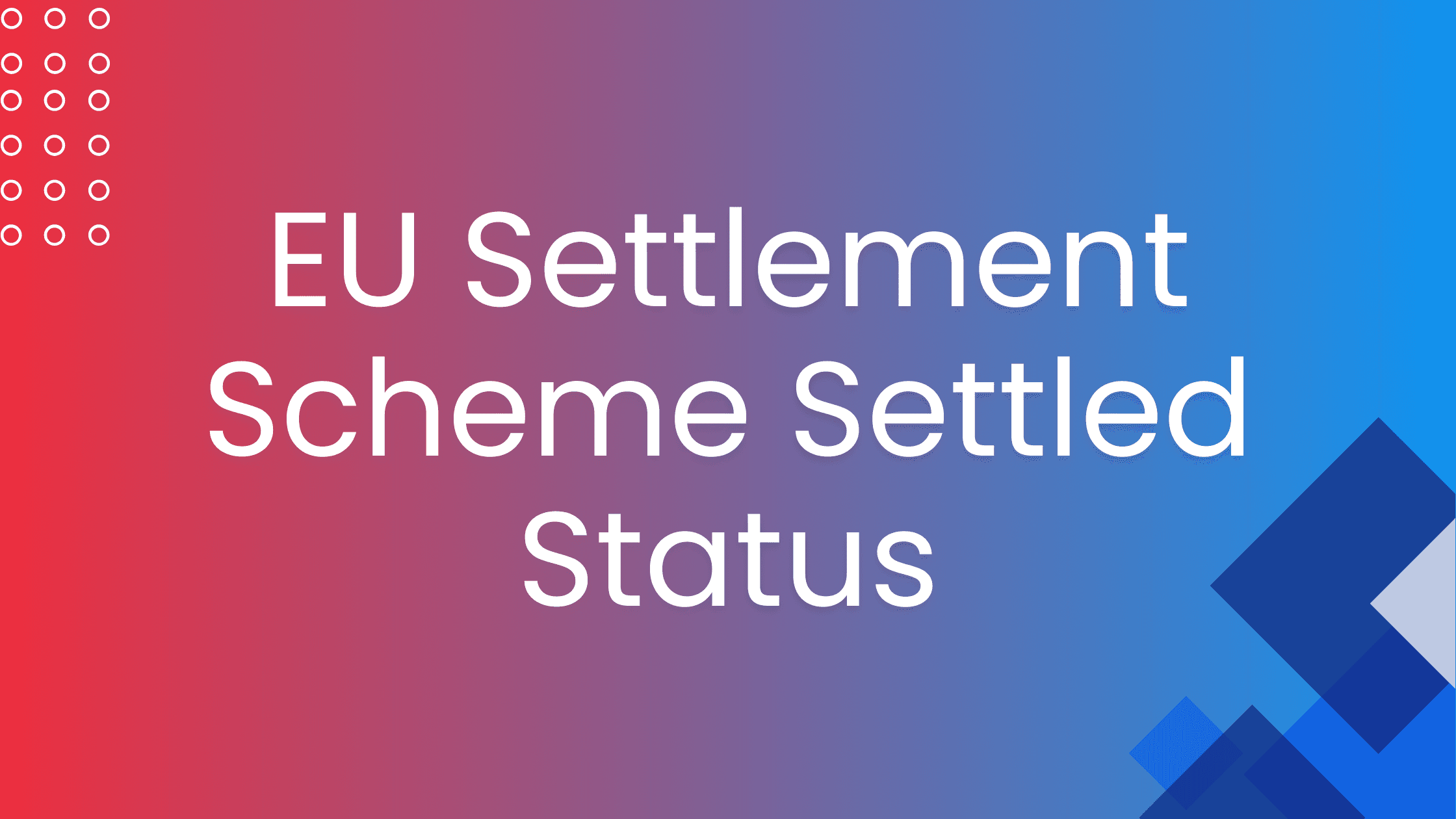
Understanding the EU Settlement Scheme Settled Status
The European Union Settlement Scheme (EUSS) is a pivotal initiative for EU, EEA, and Swiss citizens residing in the United Kingdom. Under this scheme, individuals can obtain Settled Status, which is a significant milestone on the path to securing their long-term future in the UK. In this blog, we will explore the key aspects of Settled Status and how it can empower you to continue building your life in the UK.
What Is Settled Status?
Settled Status is an immigration status granted under the EU Settlement Scheme. It is designed for individuals who have resided continuously in the UK for a specified period. The primary features of Settled Status include:
- Indefinite Residence: Settled Status provides you with the right to reside in the UK indefinitely. It essentially grants you permission to live in the UK without any time restrictions.
- Full Access to Benefits: As a holder of Settled Status, you have full access to healthcare, education, employment, and social benefits, just like UK citizens.
- Path to British Citizenship: After obtaining Settled Status, you may be eligible to apply for British citizenship.
Eligibility for Settled Status:
To qualify for Settled Status, you must meet the following criteria:
Be an EU, EEA, or Swiss citizen.
Have continuously resided in the UK for at least five years. The continuity requirement may have exceptions, especially for those who spent time abroad.
Applying for Settled Status:
The application process for Settled Status is user-friendly and can be completed online. You will need to provide documentation to prove your identity, residency, and absence of serious criminal convictions.
How WPC Can Assist You:
Work Permit Cloud (WPC) is well-versed in supporting individuals through the EU Settlement Scheme. Here's how we can assist you:
Application Guidance: We provide step-by-step guidance on the application process, ensuring all necessary documents are in order. Eligibility Evaluation: We help you determine your eligibility for Settled Status and provide advice on meeting the continuity requirements. Path to British Citizenship: If your goal is to become a British citizen, we can advise you on the next steps after obtaining Settled Status. Seize the Opportunity to Thrive in the UK Settled Status is your gateway to building your life in the UK without any time constraints. It not only ensures your continuous access to essential services but also opens doors to British citizenship. Whether you're a newcomer or a long-term resident, understanding and securing your status is essential. Contact us at WPC to learn more about the EU Settlement Scheme, Settled Status, and how we can assist you in securing your future in the UK. Don't miss the chance to continue your journey in this diverse and vibrant nation.
...
EU Family Permit
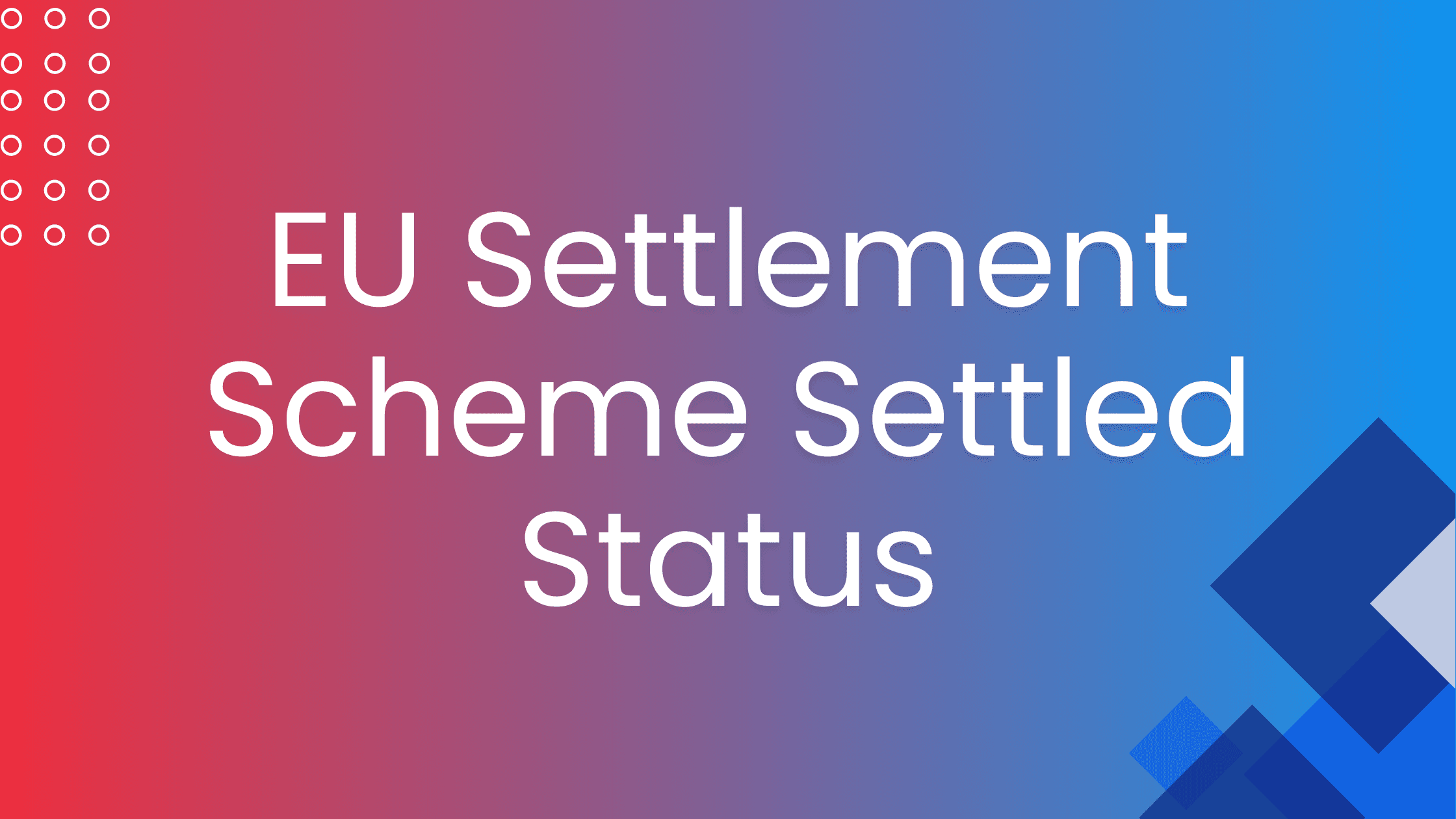
Navigating the EU Settlement Scheme Family Permit
The European Union Settlement Scheme (EUSS) has brought significant changes to the immigration landscape in the United Kingdom. It not only empowers EU, EEA, and Swiss citizens living in the UK to secure their status but also extends its benefits to their family members through the EU Settlement Scheme Family Permit. In this blog, we will explore this important aspect of the scheme, shedding light on how it works and how it can positively impact your familys future in the UK.
What is the EU Settlement Scheme Family Permit?
The EU Settlement Scheme Family Permit is a legal document that allows family members of EU, EEA, or Swiss citizens residing in the UK to join them and enjoy the same rights and privileges under the scheme. This includes the right to live, work, study, and access healthcare and other services in the UK.
Who Qualifies for the EU Settlement Scheme Family Permit?
To be eligible for the Family Permit, you must meet the following criteria:
- You are a non-EEA/Swiss family member of an EU, EEA, or Swiss citizen who has obtained or is in the process of applying for Settled or Pre-Settled Status.
- You must demonstrate your relationship with the EU, EEA, or Swiss citizen, such as being their spouse, partner, child, or dependent parent or grandparent.
Applying for the Family Permit:
- The application process involves providing the necessary documents and information to prove your relationship with the EU, EEA, or Swiss citizen. Once granted, the Family Permit allows you to join your family member in the UK.
Benefits of the EU Settlement Scheme Family Permit:
- Reunification: It allows you to reunite with your family members in the UK.
- Access to Benefits: You gain access to healthcare, education, and other services in the UK.
- Flexibility: The Family Permit provides you with the freedom to live and work in the UK without restrictions.
How WPC Can Assist You:
At Work Permit Cloud (WPC), we specialize in navigating the complexities of the EU Settlement Scheme, including the Family Permit. Here's how we can assist you:
Application Guidance: We offer step-by-step guidance on the application process, ensuring all required documents are submitted.
Eligibility Evaluation: We can assess your eligibility for the Family Permit and provide advice on gathering the necessary evidence.
Visa Support: If you're a family member of an EU, EEA, or Swiss citizen seeking to join your loved ones in the UK, we can facilitate the process and help you secure your Family Permit.
Empower Your Family's Future in the UK
The EU Settlement Scheme Family Permit is a valuable tool for keeping families together and ensuring that everyone enjoys the benefits of living in the UK. Whether you're reuniting with loved ones or planning to join family members in the UK, understanding this permit's implications is vital.
Contact us at WPC to learn more about the EU Settlement Scheme Family Permit and how we can assist you in securing your family's future in the UK. Your journey in this vibrant and diverse nation begins with the support and guidance of experts.
ILR (5 year route)
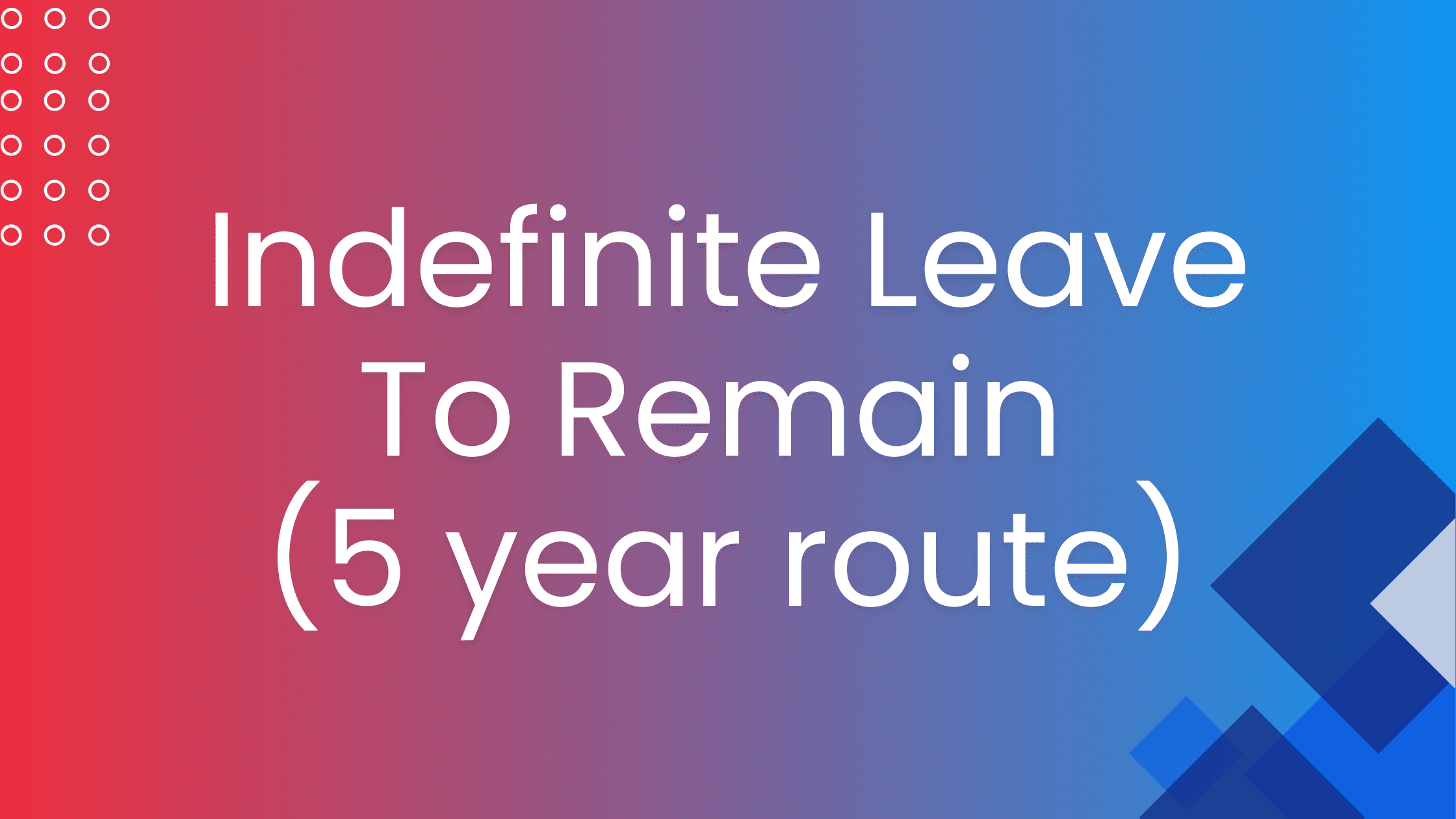
Understanding Indefinite Leave to Remain (ILR)
Indefinite Leave to Remain, often referred to as permanent residency, is a status that grants individuals the right to live and work in the UK without any time restrictions. It signifies a strong connection to the UK and the intention to make it a permanent home.
The Indefinite Leave to Remain (ILR) on the 5-Year Route is typically available to individuals who have been residing in the UK on specific visa categories for a continuous period of five years. The eligible visa categories often include:
- Skilled Worker Visa: This visa is for skilled workers with a job offer in the UK. Its one of the most common routes to ILR.
- Ancestry Visa: If you have a grandparent born in the UK and meet other requirements, you can apply for an Ancestry Visa, which can lead to ILR.
- Investor Visa: Individuals who have invested a significant amount in the UK may qualify for ILR after five years.
- Innovator Visa: Entrepreneurs and innovators can also apply for ILR through the Innovator Visa route.
- Global Talent Visa: Exceptional talent or promise in a specific field can lead to ILR via the Global Talent Visa.
- Minister of Religion Visa: Religious workers may apply for ILR after five years on this visa.
- Sportsperson Visa: Professional athletes and coaches can seek ILR through the Sportsperson Visa.
- Representative of an Overseas Business Visa: Employees of overseas businesses can apply for ILR after five years in this role.
- Turkish Worker or Businessperson Visa: Turkish nationals on specific visas can eventually apply for ILR.
Its important to note that the eligibility criteria, requirements, and rules may vary among these visa categories. Before pursuing ILR through the 5-Year Route, its advisable to consult with immigration experts or legal professionals to ensure you meet all the prerequisites and can demonstrate continuous lawful residence during the qualifying period.
Benefits of ILR (5-Year Route)
Obtaining ILR through the 5-Year Route carries several advantages:
- Permanent Residency: You can stay in the UK indefinitely, without the need for visa extensions.
- Work and Study: ILR holders have the freedom to work and study without constraints.
- Access to Benefits: You become eligible for state benefits, healthcare, and education, just like British citizens.
- Path to British Citizenship: After holding ILR for at least one year, you can apply for British citizenship.
Understanding Indefinite Leave to Remain (ILR)
Indefinite Leave to Remain, often referred to as permanent residency, is a status that grants individuals the right to live and work in the UK without any time restrictions. It signifies a strong connection to the UK and the intention to make it a permanent home.
The Indefinite Leave to Remain (ILR) on the 5-Year Route is typically available to individuals who have been residing in the UK on specific visa categories for a continuous period of five years. The eligible visa categories often include:
- Skilled Worker Visa: This visa is for skilled workers with a job offer in the UK. Its one of the most common routes to ILR.
- Ancestry Visa: If you have a grandparent born in the UK and meet other requirements, you can apply for an Ancestry Visa, which can lead to ILR.
- Investor Visa: Individuals who have invested a significant amount in the UK may qualify for ILR after five years.
- Innovator Visa: Entrepreneurs and innovators can also apply for ILR through the Innovator Visa route.
- Global Talent Visa: Exceptional talent or promise in a specific field can lead to ILR via the Global Talent Visa.
- Minister of Religion Visa: Religious workers may apply for ILR after five years on this visa.
- Sportsperson Visa: Professional athletes and coaches can seek ILR through the Sportsperson Visa.
- Representative of an Overseas Business Visa: Employees of overseas businesses can apply for ILR after five years in this role.
- Turkish Worker or Businessperson Visa: Turkish nationals on specific visas can eventually apply for ILR.
Its important to note that the eligibility criteria, requirements, and rules may vary among these visa categories. Before pursuing ILR through the 5-Year Route, its advisable to consult with immigration experts or legal professionals to ensure you meet all the prerequisites and can demonstrate continuous lawful residence during the qualifying period.
Benefits of ILR (5-Year Route)
Obtaining ILR through the 5-Year Route carries several advantages:
- Permanent Residency: You can stay in the UK indefinitely, without the need for visa extensions.
- Work and Study: ILR holders have the freedom to work and study without constraints.
- Access to Benefits: You become eligible for state benefits, healthcare, and education, just like British citizens.
- Path to British Citizenship: After holding ILR for at least one year, you can apply for British citizenship.
ILR (10 year route)
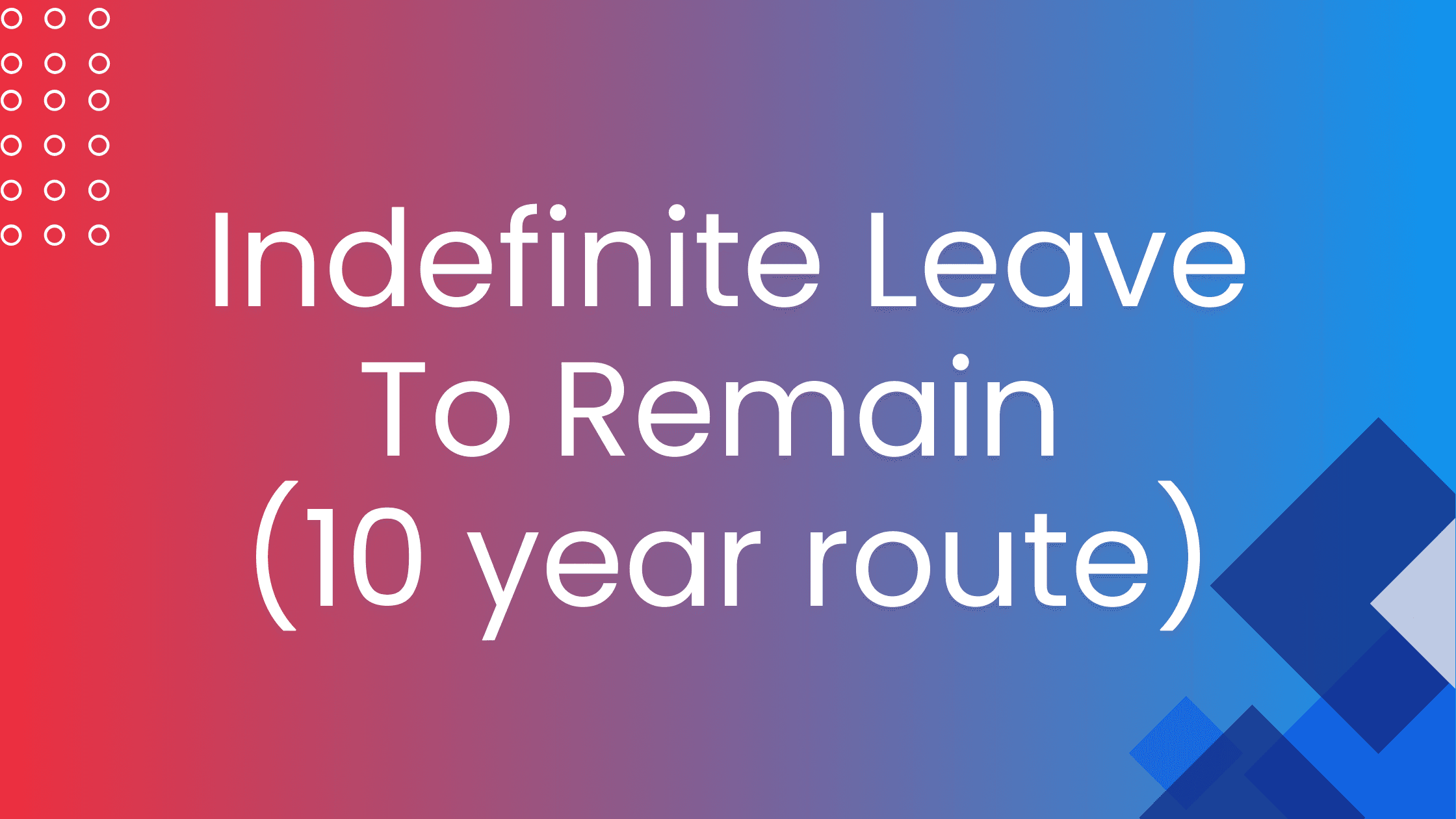
Understanding Indefinite Leave to Remain (ILR)
Indefinite Leave to Remain, often referred to as permanent residency, is a status that grants individuals the right to live and work in the UK without any time restrictions. It signifies a strong connection to the UK and the intention to make it a permanent home.
For the 10-Year Route to Indefinite Leave to Remain (ILR), you can count time spent in the UK on various visa categories, provided that your stay has been continuous and lawful. Here are some of the common visa categories that can contribute to your eligibility for ILR through the 10-Year Route:
Tier 1 (General) Visa: The Tier 1 (General) visa allowed highly skilled workers to live and work in the UK. Time spent on this visa can be counted toward the 10 years. Tier 2 (General) Visa: The Tier 2 (General) visa is for skilled workers with a job offer in the UK. If you've held this visa during your stay, that time can be counted toward the 10-year requirement. Ancestry Visa: An Ancestry Visa is available to individuals who have a grandparent born in the UK. Time spent on this visa can be considered for the 10-Year Route. Spouse, Partner, or Family Visa: If you've been in the UK on a spouse, partner, or family visa (e.g., Spouse Visa, Unmarried Partner Visa), the time spent on these visas can count toward the 10 years. Tier 4 (General) Student Visa: If you held a Tier 4 (General) Student Visa while studying in the UK, the duration of your studies can contribute to the 10 years, provided it was within the rules. Work Permits: If you held a work permit before the introduction of the Points-Based System, the time spent on this visa can be included. It's important to keep in mind that your entire stay in the UK must be both continuous and lawful to qualify for ILR on the 10-Year Route. Any periods of overstaying or being in the UK without lawful status can break the continuity of your residence. The application process for ILR is a significant step and requires careful documentation. It's advisable to seek professional guidance to ensure that all criteria are met and the application is correctly filed.
Other Long-Term Visas: Certain other long-term visas may also be eligible, but the specific conditions can vary. It's essential to review the rules for your particular visa category.
Asylum Seeker or Refugee: Time spent as an asylum seeker or refugee in the UK may count toward the 10 years.Applying for ILR (10-Year Route)
20 Year Private Life Route

Understanding the 20-Year Private Life Route
Eligibility Criteria
To be eligible for the 20-Year Private Life Route, you must meet several key criteria:
British Citizenship
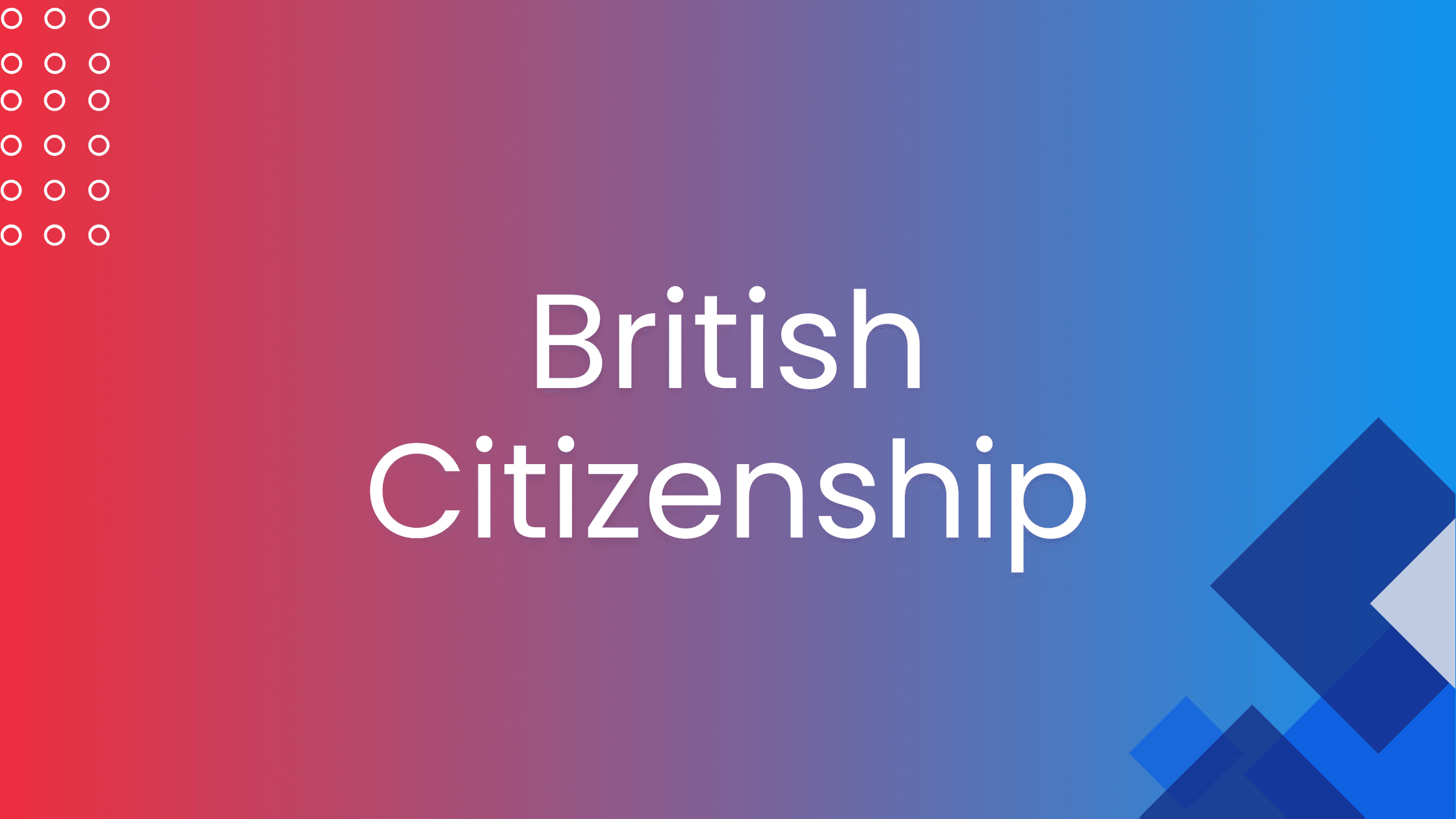
The Importance of British Citizenship
British citizenship not only grants you the right to reside in the UK but also represents a deep connection to the country and its values.
Eligibility Criteria for British Citizenship
Before embarking on the journey to becoming a British citizen, it's vital to ensure you meet the following eligibility criteria:
1. Age Requirement for British Citizenship: Generally, you must be at least 18 years old to apply for British citizenship.
2. Residency and British Citizenship: You'll typically need to have resided in the UK for a specific period, which varies based on your circumstances.
3. Good Character for British Citizenship: Being of good character is a key requirement, meaning no significant criminal record and adherence to UK laws.
4. Knowledge and Language for British Citizenship: Successfully passing the Life in the UK test and meeting English language requirements are typically necessary.
5. Financial Aspects of British Citizenship: Ensuring there are no outstanding debts related to the NHS and covering the application fee are part of the process.
The Application Process for British Citizenship
The journey towards British citizenship involves completing an application form, including detailed information about your identity, residence, and character.
Waiting Period for British Citizenship
After submitting your application, you'll need to be patient as you wait for a decision from the Home Office. The waiting period can vary, but maintaining open communication with the authorities is essential.
The Significance of the Citizenship Ceremony for British Citizenship
Once you receive approval, you'll be invited to a citizenship ceremony. This ceremony is a vital part of the British citizenship process, where you pledge allegiance to the UK.
Benefits of British Citizenship
British citizenship brings numerous benefits, including the right to abode in the UK, full participation in British society, eligibility for a British passport, diplomatic protection abroad, and access to UK benefits.
British citizenship represents a significant step in your journey towards full integration into British society. By meeting the eligibility criteria and demonstrating your commitment to the UK, you can unlock a world of opportunities, both personal and professional. Your pursuit of British citizenship signifies your dedication to a brighter future in a nation rich in history and promise.
Naturalisation

Understanding Naturalisation
Naturalisation, the process of acquiring British citizenship, is a key milestone in your life as a foreign national in the UK.
Eligibility Criteria for Naturalisation
To embark on your journey towards British citizenship through naturalisation, its essential to ensure you meet the following criteria:
Age Requirement for Naturalisation
You must be at least 18 years old to apply for naturalisation.
Residency and Naturalisation
Typically, you should have lived in the UK for at least five years before applying for naturalisation.
Good Character and Naturalisation
Applicants must demonstrate good character, indicating a clean criminal record and adherence to UK laws.
Knowledge of Life in the UK and Naturalisation
Passing the Life in the UK test and meeting English language requirements are essential steps in your naturalisation journey.
Financial Requirements for Naturalisation
Ensure there are no outstanding debts related to the NHS and be prepared to pay the application fee.
The Application Process for Naturalisation
The naturalisation process involves completing an application form, providing essential details about your identity, residence, and character.
Waiting Period for Naturalisation
After submitting your application, you'll enter a waiting period. The duration can vary, but patience is key.
The Significance of the Citizenship Ceremony in Naturalisation
Upon receiving approval, you'll be invited to a citizenship ceremony. It's a vital aspect of the naturalisation process where you pledge allegiance to the UK.
Benefits of Naturalisation
British citizenship through naturalisation offers several significant benefits, including the right to abode, full participation in British society, access to a British passport, diplomatic protection abroad, and eligibility for UK benefits.
Naturalisation is a meaningful journey towards becoming a British citizen. If you meet the naturalisation criteria and are ready to commit, it's a rewarding path that opens doors to
BNO Status
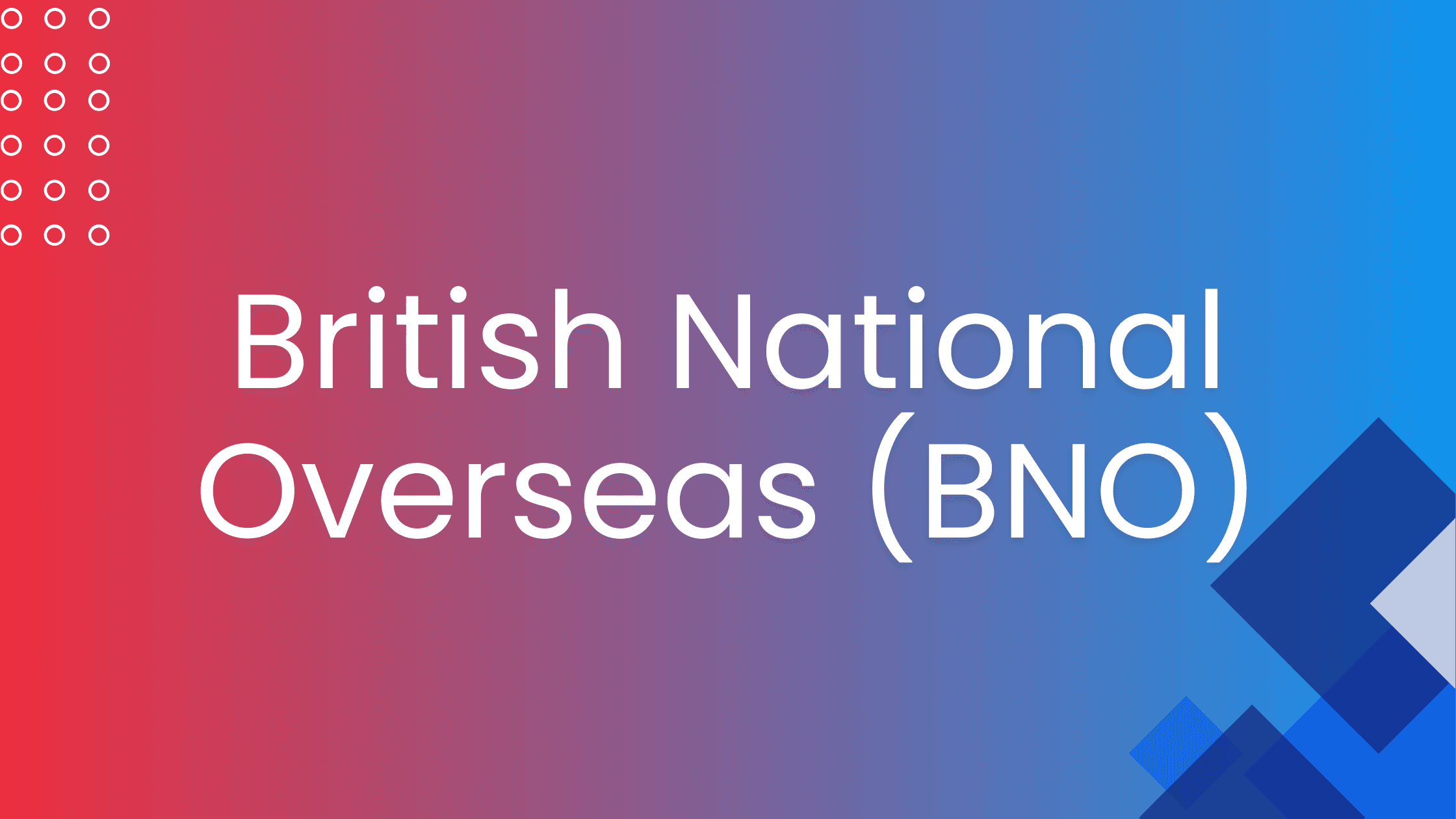
What is British National Overseas (BNO)?
People who were British overseas territories citizens by connection with Hong Kong were able to register as a British national (overseas) before 1 July 1997. British overseas territories citizens from Hong Kong who did not register as British nationals (overseas) and had no other nationality or citizenship on 30 June 1997 became British overseas citizens on 1 July 1997. Please note that, If people are not already a British national (overseas), they cannot apply to become one.
What is a Hong Kong BNO visa?
The Hong Kong BNO visa is a UK visa option for eligible Hong Kong residents who hold or are eligible to apply for BNO status. It is designed to provide a pathway for Hong Kong residents to live and work in the UK for an extended period, offering a level of security and stability that many individuals in Hong Kong find increasingly attractive.
Who can apply for a BNO visa?
If you’re from Hong Kong and are a British national (overseas) you and your family members can apply for a BNO visa.
If you’re the child of a British national (overseas) aged 18 or older and born on or after 1 July 1997, you can apply separately from your parent. Your family members can also apply with you.
Requirements of BNO visa
You can apply for a BNO visa if you’re 18 or older and either:
a British national (overseas)
the child of a British national (overseas) born on or after 1 July 1997
Your permanent home must be:
in Hong Kong, if you’re applying from outside the UK
in the UK, the Channel Islands, Isle of Man or Hong Kong if you’re applying in the UK
Do BNO visa holders have the Right to Work in the UK?
Yes, BNO Visa holders have the Right to Work in the UK, they also have the right to study and access the National Health Service (NHS) in the UK.
How long you can stay under the BNO visa?
You can apply to stay for either of the following durations:
a. 2-year and 6-month visa.
b. 5-year visa.
If you wish to extend your stay, you can apply for visa extensions while in the UK, and there is no limit to the number of times you can apply for extensions.
After residing in the UK for a continuous period of 5 years, you become eligible to apply for perman
...Administrative Review

Understanding Administrative Review
Administrative Review is a process that allows individuals to challenge certain immigration decisions made by the Home Office. It provides an avenue for review, correction, and clarification of these decisions.
When Can You Request Administrative Review?
You can request Administrative Review if your application for entry clearance, leave to remain, or other types of visa applications are refused. Administrative Review may also be applicable in cases involving revocations, cancellations, or curtailment of existing visas.
The Administrative Review Process
Navigating an Administrative Review involves several steps:
1. Request Administrative Review: You must apply for an Administrative Review within a specific timeframe mentioned in your decision notice. This is typically 14 days, but it's essential to review your specific decision.
2. Evidence and Documentation: Gather and submit any additional evidence or documents that support your case.
3. Independent Review: Your case will be reviewed independently by a different immigration official who was not involved in the initial decision.
4. Outcome Notification: You'll receive a decision on your Administrative Review. If your review is successful, your application will be reconsidered.
Working with Administrative Review Experts Navigating the Administrative Review process can be challenging, and the stakes are high. Seeking professional guidance from experts in immigration law can significantly increase your chances of a favorable outcome. Key Considerations for Administrative Review Success To increase your chances of success in an Administrative Review, consider the following: Seek legal advice and representation to ensure your case is presented effectively. Compile and submit compelling evidence supporting your case. Ensure your request for review is made within the stipulated timeframe. Keep informed about immigration laws and regulations that may affect your case. Administrative Review is a valuable tool that allows individuals to challenge immigration decisions that they believe are incorrect or unjust. By seeking professional legal assistance and presenting your case effectively, you can increase your chances of a successful Administrative Review. Correcting an immigration decision through Administrative Review can be a crucial step in securing your immigration status or visa to the UK.
...
Appeal To The Tribunal

Understanding the Appeal to the Tribunal
An Appeal to the Tribunal is a formal process that allows individuals to challenge certain immigration decisions. This process provides an opportunity to have these decisions reviewed, reconsidered, and potentially overturned.
When Can You Lodge an Appeal to the Tribunal?
You can initiate an Appeal to the Tribunal if you disagree with a decision made by the Home Office, such as a visa refusal, deportation order, or changes to your immigration status. It is important to note that not all immigration decisions are eligible for appeal, so understanding your specific situation is crucial.
The Appeal to the Tribunal Process
Championing an Appeal to the Tribunal entails several crucial steps:
- Initiate the Appeal: You must apply for an appeal within the prescribed timeframe stated in your decision notice, typically 14 days. It is essential to adhere to this timeline.
- Gather Supporting Evidence: Collect and submit compelling evidence, documentation, and arguments that bolster your case.
- Tribunal Hearing: Your case will be heard by an independent judge who will assess the evidence and make a decision based on the merits of your case.
- Outcome Notification: After the hearing, you will receive a decision from the Tribunal, which may confirm, amend, or overturn the original immigration decision.
Appealing to the Tribunal is a complex and crucial process that can have a significant impact on your immigration status. To enhance your chances of a successful outcome, consider seeking professional guidance from immigration law experts who understand the intricacies of the process. To increase your chances of success when appealing to the Tribunal, keep these key considerations in mind: Engage legal experts who can effectively present your case. Gather robust evidence and compelling documentation to support your appeal. Adhere to the prescribed time frame for initiating the appeal. Stay informed about relevant immigration laws and regulations that may pertain to your case. Appealing to the Tribunal is a vital means of addressing immigration decisions that you believe are unjust or inaccurate. By seeking professional legal assistance and presenting your case effectively, you can enhance your prospects of a favorable outcome through the Tribunal process. Correcting an immigration decision through an Appeal to the Tribunal can be a pivotal step in securing your immigration status in the UK.Seeking Expert Guidance for Your Appeal to the Tribunal
Critical Considerations for Tribunal Appeal Success
Judicial Review

Understanding Judicial Review
Judicial Review is a legal process that allows individuals and organizations to challenge government decisions, actions, or omissions in a court of law. It serves as a vital check and balance to ensure government actions are lawful and fair.
When Can You Seek Judicial Review?
You can initiate a Judicial Review when you believe that a government decision or action falls into one of the following categories:
Illegality: When you believe the government acted beyond its legal powers, or the decision was made without legal authority.
Irrationality: If you think the decision is so unreasonable that no reasonable authority could have made it.
Procedural Impropriety: When the decision-making process was unfair or violated established procedures.
The Judicial Review Process
Engaging in Judicial Review involves several fundamental steps:
Seek Legal Advice: It's vital to consult with legal experts to assess the merits of your case and decide if Judicial Review is an appropriate course of action.
Issue Proceedings: To start the process, you must apply to the court for permission to proceed with the Judicial Review.
Gather Evidence: Collect evidence, documentation, and arguments that support your case.
Court Hearing: Your case will be heard by a judge in a court of law, where your arguments and evidence will be presented and considered.
Judgment: The judge will make a decision, which may uphold, amend, or overturn the government decision.
Why Seek Expert Legal Guidance for Judicial Review?
Navigating the complexities of Judicial Review requires a deep understanding of administrative law. Legal experts can provide guidance, formulate compelling arguments, and present your case effectively.
Key Considerations for Successful Judicial Review
To enhance your chances of a successful Judicial Review, remember these essential considerations:
Seek professional legal advice to evaluate the merits of your case.
Compile strong evidence and compelling documentation to support your arguments.
Adhere to the prescrib
Sponsor Licence Renewal

UK - Tier 2 Sponsor Licence Renewal
Navigate the sponsor licence renewal process with confidence. Our experts specialize in sponsor licence renewals. Explore your options today.
About Sponsor Licence
A Skilled Worker (formally known as Tier 2 scheme) Sponsor Licence is a licence that gives UK employers permission to hire migrant skilled workers from within and outside of the UK.
Due to the impact of Brexit and the Covid pandemic, many organisations suffer from staff shortage issues, especially NHS, logistics, agriculture and farming, hospitality industry, restaurants and care homes, some organisations even had to close their business because they could not find any suitable employees from the local level market.
However, if a company has a valid sponsor licence, their options are broader, they can access the global talent pool and recruit skilled workers from overseas. If you want to know how to apply for a Sponsor Licence, please read our previous blog here.
WorkPermitCloud Limited has received a lot of inquiries about Sponsor License applications, and we have accumulated rich experience in successful applications. Here we highlight some common questions regarding the Sponsor License: How long does a sponsor licence last? What to do if it expires?
How long does a Sponsor Licence last before you need to renew it?
Once you got your sponsor licence granted from the Home Office, your sponsor licence will remain valid for 4 years from the date. You can find the start and expiration date on the licence summary on your Sponsorship Management System (SMS). However, if you do not comply with your sponsor duties during the 4 years, your sponsor licence might be suspended, revoked or downgraded. If you want to know the duties of a Licenced Sponsor, please read our previous blog here.
If you want to continue to sponsor your migrant employees after the expiry date, you’ll need to renew your licence well in advance of the expiry date.
When to renew a Sponsor Licence?
You can apply for a renewal 90 days before the expiration date. You cannot renew your sponsor licence when the expiration date is due, when your sponsor licence is expired, you’ll have to apply for a Sponsor Licence again if you wish to continue to sponsor your migrant workers.
Even if your employee might have a longer period visa than your sponsor licence, you still have to renew your sponsor licence to legally employ your migrant workers.
Who should renew the Sponsor Licence?
The Sponsor Licence renewal application should be done by the Level 1 user, Level 1 user must be appointed by the Authorising Officer (AO) through the SMS, if the Level 1 user and AO is the same person, the AO can also submit the renewal application. Level 1 user is responsible for all day-to-day management of your licence using the SMS.
How to renew a Sponsor Licence?
The Sponsorship Licence Renewal process should be done through SMS. The Level 1 user must have the authority of the AO to submit the Sponsor Licence Renewal application, and the ‘Name’ and ‘Position within the organisation’ entered in the declaration form should be the level 1 user.
How much does it cost to renew a Sponsor Licence?
For a small organisation/charity (1-50 staff, less than 10.2 million annual turnovers, total assets are worth £5.1 million or less), the renewal fee is £536. For a medium or large organisation (more than 50 staff, more than10.2 million annual turnovers, total assets are worth more than £5.1 million), the renewal fee is £1476.
What to pay attention to during the Sponsor Licence Renewal?
Around the time of Sponsor Licence renewal, you need to make sure you still have a robust HR system in place, i.e. WpcHr (https://workpermitcloud.co.uk/hrms), keep following your sponsor duties (record keeping and reporting), should also be prepared for a compliance visit, this is to ensure that you remain compliant and still qualify for a Sponsor Licence.
...
Switching to a UK Care Worker Visa? The 3-Month Experience Rule Explained (SOC 6135 & 6136)
28 Jan 2026
10:05 am
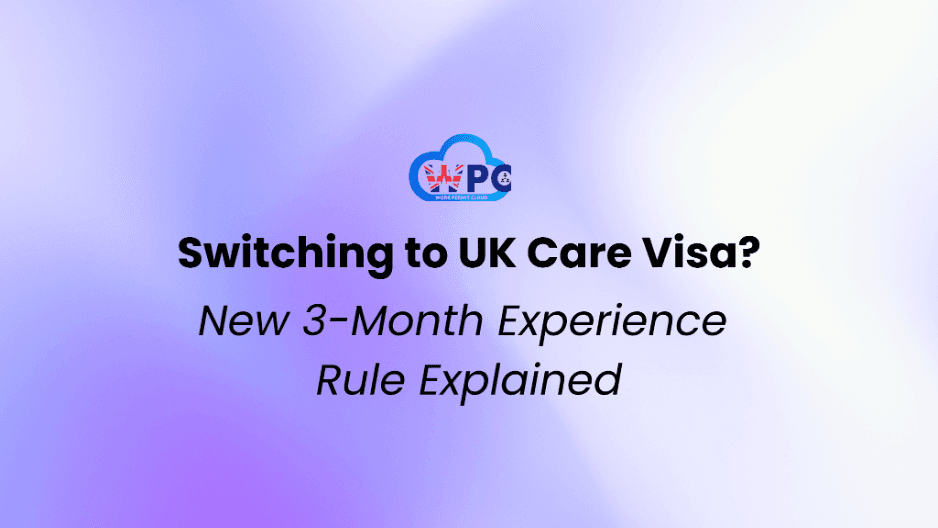
Key Takeaways
- Mandatory Experience: Students, Graduate (PSW) visa holders, and other visa holders must have at least 3 months of relevant care experience before switching..
- Specific SOC Codes: This rule applies specifically to SOC Code 6135 (Care Workers) and SOC Code 6136 (Senior Care Workers).
- Medical Experience Isn't Enough: General medical roles, such as auxiliary nursin
UK ILR for Children and Parents: The 7 Year vs. 12 Year Rule Explained
27 Jan 2026
09:23 am
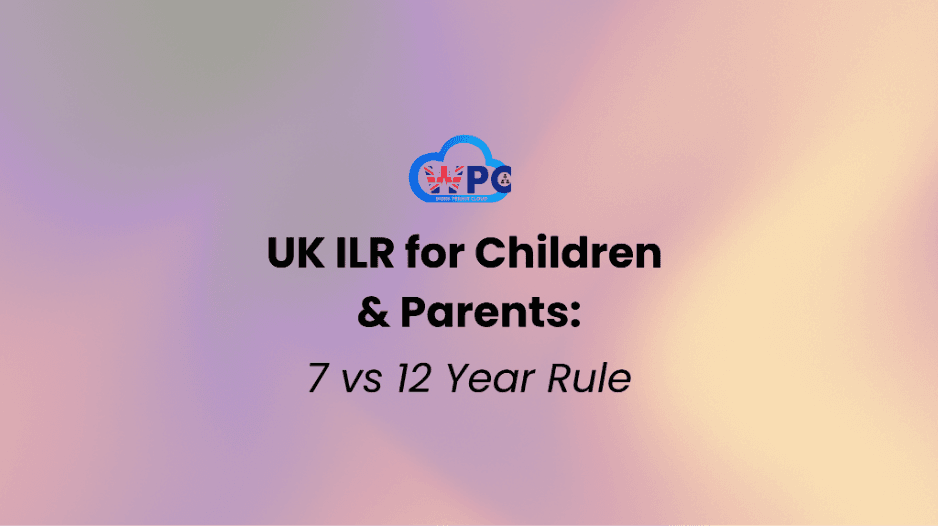
Key Takeaways
- Birth Location is Key: Children born in the UK may apply for ILR after 7 years of continuous residence, whereas those born outside the UK typically face a longer 12-year path.
- 7-Year Rule for Children: This route applies regardless of whether the child’s residence was lawful or unlawful, provided it would not be reasonable for the child to leave the UK and it has been continuous.
- The 12-Year Total: Children born outside the U
UK English Language Requirements for Immigration Applications (Updated January 2026)
23 Jan 2026
05:12 pm
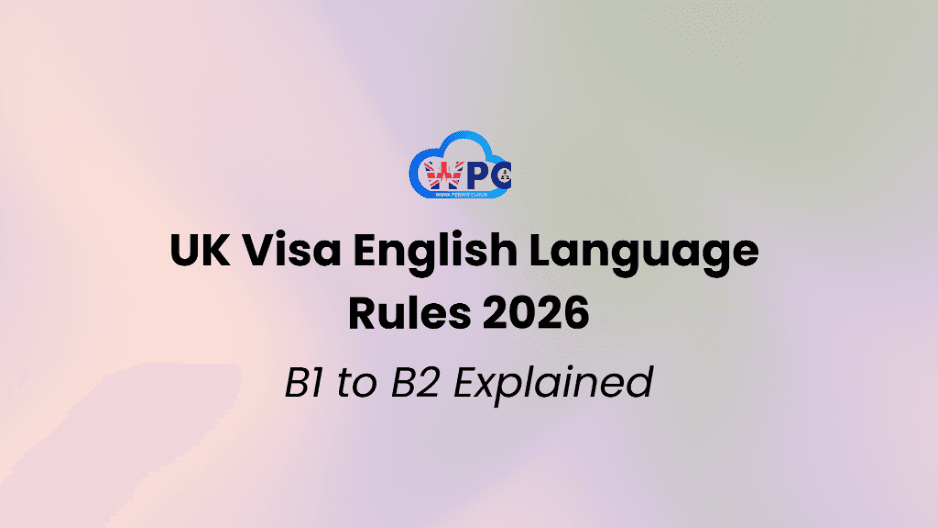
Key Takeaways
- New B2 Requirement: As of January 8, 2026, the English language requirement for Skilled Worker, Scale-up, and High Potential Individual visas has increased from level B1 to B2 (roughly A-Level standard).
- Affected Applicants: This change primarily targets new applicants for entry clearance.
- Extension Rules: Migrants already in the UK on these routes may typically continue to meet the
London Employers Fined £6.7m: Right to Work Check Mistakes to Avoid
20 Jan 2026
05:22 pm

Key Takeaways
- London employers were fined £6.7 million in just six months for illegal working breaches.
- Seeing a BRP or ARC card is not enough to complete a right to work check.
- Expiry dates on cards do not always reflect actual visa status.
- ARC card holders usually require an Employer Checking Service (ECS) check.
UK Spouse Visa (FLR(M)) vs Private Life Visa (FLR(FP)): Which Route Is Right for You in 2026?
16 Jan 2026
06:29 pm

Key Takeaways
- Two Primary Routes: The Standard Spouse Visa (FLR M) leads to settlement in 5 years, while the Private Life/Family Route (FLR FP) takes 10 years.
- The Financial Hurdle: New applicants generally need a minimum income of £29,000. However, those extending visas granted before 11 April 2024 may still qualify under the lower £18,600 threshold, and those on certain disability benefits are exempt from the minimum income entirely.
- The Safety N
UK Immigration Changes in 2026: What Migrants & Employers Need to Know
13 Jan 2026
08:23 pm

Key Takeaways
- English language rules tightened from January 2026: New Skilled Worker, Scale-up and HPI applicants must now meet B2-level English, making early preparation essential.
- ETA becomes mandatory for visitors from February 2026: Travellers from 85 visa-free countries must obtain approval before travelling to the UK.
- Settlement rules may change significantly in April 2026: The proposed Earned Settlement
Changing Jobs or Employers on a UK Skilled Worker Visa: The Complete Guide
29 Dec 2025
05:22 pm

Key Takeaways
- You can change jobs or employers on a Skilled Worker visa, but many changes require Home Office approval before you start work.
- You must receive a new Certificate of Sponsorship (CoS), and a new visa application is required if you move to a new employer, change occupation code, leave the Immigration Salary List, or take a second sponsored job over 20 hours per week.
- Not all changes trigger
Sponsor Licence Revoked: Can I Keep My Second Job? (Supplementary Work Rules Explained)
24 Dec 2025
05:13 pm

Key Takeaways
- Supplementary work on a Skilled Worker visa is legally dependent on your main sponsored job.
- You can usually continue supplementary work only if your main employer is still operating and you are still working for them during the curtailment period.
- If your main job ends or the business closes, all supplementary work must stop immediately, even if time remains on your visa.
Sponsor Licence Revoked? Can Skilled Workers Continue Working During the 60-Day Curtailment Period?
22 Dec 2025
03:53 pm

Key Takeaways
- A sponsor licence revocation does not automatically mean you must stop working immediately.
- Most Skilled Workers can continue working during the 60-day curtailment period if the business is still operating.
- The 60-day curtailment period is meant to give workers time to find a new sponsor, switch visa routes, or leave the UK lawfully.
UK-Born Children of Migrants & Deportation: The New 2025 Rules Explained
15 Dec 2025
06:34 pm
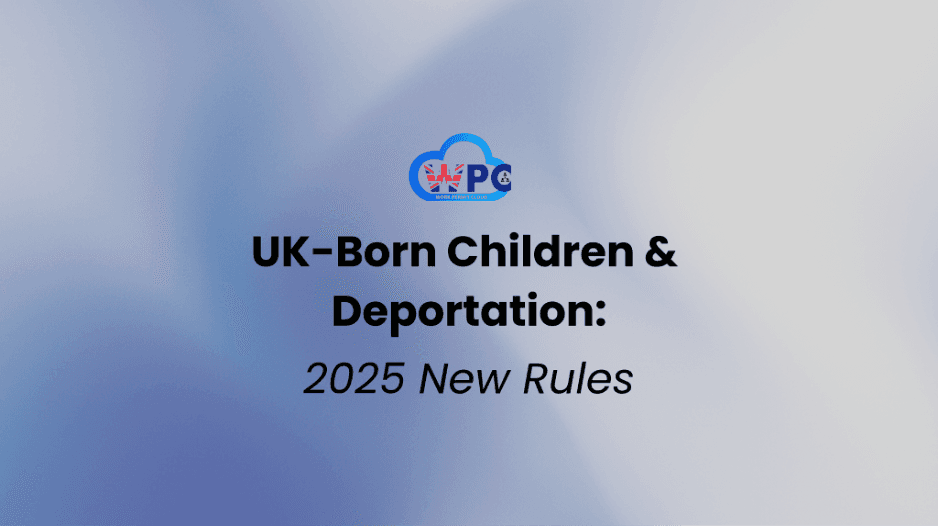
Key Takeaways
- Being born in the UK no longer acts as a safeguard against removal for non-British children.
- Families with no lawful status — including failed asylum seekers — may now face removal as a unit.
- Article 8 family life arguments are being restricted, making it harder to remain in the UK on the basis of having children here.



